#I know I have quite a few antagonists who are bigots
Text
Constantly thinking about a conversation me and a buddy had about how people in the modern era always end up making or Headcanoning villains as homophobic or just general bigots...
#No bc I think it’s a very interesting phenomenon#our conversation came down to how people are honestly unable to comprehend a person is horrible unless they’re a bigot#the example we were talking about is how so many ppl headcanon William Afton furnaff was homophobic to make him like. worse#when like. he’s already a kiddy murderer. I don’t think he can get any worse than that? he kills kids and is an abusive father#no need for him to also be a bigot but yet it’s a popular headcanon#and my pal said it’s bc a lot of ppl are unable to comprehend villains who are complex and have complex opinions/world views#and tbh YEAH!!! I think it’s really common for us to see villains or just people we don’t like as. unable to be like us#if a person sucks then we cannot have anything in common with them. when that isn’t the case#not everyone person who’s a piece of shit is a bigot. it’s common sure but not every villain is gonna be openly racist or transphobic#if anything a villain who has the same world views as the heroes/protags/audience makes them more complex!!#because it can show that anyone who is considered ‘a good person’ can actually be a pos despite their views or show how a person can fall to#-the dark side lol#and yeah obviously in certain cases a villain being a bigot makes sense and works story wise#I know I have quite a few antagonists who are bigots#but it’s a super common pitfall to just assign an antagonist ‘oh they suck so they also hate autistic people!’ or smth instead of like#just letting their horrible actions show how they’re a horrible person#I promise if a serial killer is a serial killer then like. yeah THEYRE horrible. and if you can only see them as horrible if they’re a bigot#then uh. I don’t know what to say to that!!!!!!#also going back to the complex point I know it’s common for people to not comprehend when a character does something bad and is considered b#-ad in the story unless it is EXPLICITLY spelled out! and I think the bigot stuff ties into that#ppl refuse to be like ‘ohhh this is a villain!’ unless the guy drops a bunch of slurs lol#once again depending on the story a bigoted villain makes sense and I have several bigot Ocs#but sometimes. bad people are progressive. or just aren’t homophobic. sometimes they have the same views as us#and sometimes... that makes them scarier and better written.#IDFK why I shared this rant here I just thought it was interesting and also this is a site where ppl make every villain in media#-homophobic soooo-
3 notes
·
View notes
Note
What's your opinion on Entrapta and Entrapdak ? I personally think she deserves better tbh 😔
i don't think entrapdak works. but i'll get into that in a minute.
as for entrapta, she definitely deserved better. more so than just in writing in general, but as well just how she was treated as an autistic individual.
for starters, i want to comment on her design. she does not look like the age she's apparently supposed to be ( according to nate, entrapta is in her late 20s, early 30s ). a lot of people who have discovered this have commented something to the extent of:
"she's 30?! i thought she was 16-18!"
now, if i didn't know her age or personality, i'd assume she was 19-20. but considering that i do know her personality, i'm not surprised that people thought she was younger. her big pigtails, being short, and the top side of her overalls being out of place all are designed in a way that makes her look younger.
the reason why this is an issue is because, with her design and personality, this is infantilizing. especially because every other adult character looks their age, or at least has obvious implications of looking older ( such as wrinkles under their eyes, wearing makeup, etc. ). entrapta does not.
throughout the entire show, entrapta is extremely oblivious, forgetful, honestly rather careless, and generally is treated more like a robotic nuisance rather than a human being that deserves support and care.
she's practically ostracized by the other princesses, is pulled by them, is leashed by them, talked down to by them, etc. she is not actually treated as someone who is wanted, but rather only someone who might be needed.
this video actually discusses low empathy, how to write it correctly, and how SPOP did a complete disservice to entrapta and the autistic community by their piss-poor portrayal of low empathy and autistic people in general:
youtube
as for entrapdak...
i personally feel like nate made entrapta 30-smth yrs old, so entrapdak would be less weird. i could talk about how hordak is essentially a bum instead of a Big Bad, like he's supposed to be, but that's for another day.
the primary issue i have with entrapdak is that it paints entrapta in a really bad light, more than people might think.
many people seem to label entrapta as morally grey/chaotic neutral ( i'm p sure you can look up the spop wiki and see that ), but i strongly disagree with this label, due to how it is written and how it further pushes a bigoted idea of autistic people.
and no, entrapta being written by an autistic person ( tbh, i highly doubt that ) does not mean she's suddenly even decent autistic rep.
entrapta is perceived as "morally grey" purely because of her low empathy. they use it to demonize and infantilize her, instead of respecting it as a part of her identity.
having low empathy does not make anyone a bad person, or even a morally grey person. donnie, from ROTTMNT, has low empathy, but you can tell he deeply loves his family and tries his best to keep people safe.
entrapta's low empathy is represented as her not caring about the lives at stake, only caring about people unless it involves technology, or only doing things because of technology, and is generally either treated like a lost child or like she's a demon.
SPOP's portrayal of autism and low empathy in quite a few autistic people is harmful and gives the same message that neurodivergent in general have been given for years:
"something is wrong with you."
her being involved with hordak, a literal imperialist, someone who does not care for anyone ( except for entrapta, i guess? ), and is willing to sacrifice anything and anyone for the sake of his goals, in any other way but in an antagonistic dynamic is, at best, offensive and stereotypical, and at worst, dangerous.
if you are not autistic, and you want to write autistic people, you need to do it with respect. genuine respect.
you cannot treat autistic people as if they don't know what they're doing.
you cannot treat autistic people as if they don't care about anyone but themselves.
you cannot treat autistic people as if something is wrong with them.
you cannot treat autistic people as if they have to change to be accepted by anybody.
we are not your props for representation. we are people.
all in all, if you want to write autistic characters, do not do what the SPOP writers did. just don't.
and honestly, hordak is really weak in this show, i-
#spop#she ra#spop critical#spop salt#spop entrapta#she ra entrapta#entrapta#spop hordak#she ra hordak#hordak#entrapdak#nate stevenson#fuck nate#all my homies hate nate#entrapta deserved better#autistic representation#autistic rep
64 notes
·
View notes
Text
Not Up For Interpretation - An Essay On Nonbinary - Erasure
(Trigger Warning: Misgendering, Transphobia, Nonbinary-phobia)
If you’ve been following me for a while, you probably know this was a long time coming. I’ve made several posts about my frustrations concerning this topic and how much it hurt me just how socially accepted erasing an entire identity still is. While representation marches on and things have become better for nonbinary people as a whole, we still battle with a lot of prejudice - both intentional and unintentional.
In this essay, I want to discuss just how our identities are being erased almost daily, why that is harmful and hurtful and what we all can do to change that.
Chapters:
What does Non-binary mean?
Nonbinary- representation in media
So what’s the problem?
How do we fix it?
1. What Does Non-binary Mean?
Non-binary is actually an umbrella term. It includes pretty much every gender-identity that’s neither one or the other so to speak, for example, agender.
Agender means feeling detachment from the gender spectrum in general. If you’re agender, you most likely feel a distance to the concept of gender as a whole, that it doesn’t define you as a person.
There are many identities that classify under non-binary: There’s gender-fluid (you feel you have a gender, but it’s not one gender specifically and can change), demi-gender (identifying as a gender partially, but not completely) and many others.
Sometimes, multiple non-binary identities can mix and match.
Most non-binary people use they/them pronouns, but like with so many things, it varies.
Some nonbinary-people (like me) go by two pairs of pronouns. I go by both she/her and they/them, because it’s what feels most comfortable at the moment. But who knows, maybe in the future I’ll switch to they/them exclusively or expand to he/him.
There is no one defining non-binary experience. Nb-people are just as varied and different as binary people, who go by one specific gender.
There are non-binary people who choose to go solely by she/her or he/him and that’s okay too. It doesn’t make them any more or less non-binary and their identity is still valid.
If your head’s buzzing a bit by now: That’s okay. It’s a complicated topic and no one expects you to understand all of it in one chapter of one essay.
Just know this: If a person identifies as non-binary, you should respect their decision and use the pronouns they go with.
It’s extremely hurtful to refer to someone who already told you that they use they/them pronouns with she/her or he/him, or use they/them to refer to a person who uses she/her.
Think about it like using a trans-person’s deadname: It’s rude, it’s harmful and it shows complete disrespect for the person.
Non-binary people have existed for a very long time. The concept isn’t new. The idea that there are only two genders, with every other identity being an aberration to the norm, is largely a western idea, spread through colonialism.
The Native American people use “Two-Spirit” to describe someone who identifies neither as a man nor a woman. The term itself is relatively new, but the concept of a third gender is deeply rooted in many Native American cultures.
(Author’s Note: If you are not Native American, please do not use it. That’s cultural appropriation.)
In India, the existence of a third gender has always been acknowledged and there are many terms specifically for people who don’t identify with the gender that was assigned to them at birth.
If you’re interested in learning more about non-binary history and non-binary identities around the world, I’d recommend visiting these websites:
https://nonbinary.wiki/wiki/History_of_nonbinary_gender
https://nonbinary.wiki/wiki/Gender-variant_identities_worldwide
https://thetempest.co/2020/02/01/history/the-history-of-nonbinary-genders-is-longer-than-you-think/
https://www.teenvogue.com/story/gender-variance-around-the-world
Also, maybe consider giving this book a try:
Nonbinary Gender Identities: History, Culture, Resources by Charlie Mcnabb
2. Non-binary Representation In Media
The representation of non-binary people in mainstream media hasn’t been... great, to put it mildly.
Representation, as we all know, is important.
Not only does it give minorities a chance to see themselves in media and feel heard and acknowledged. It also normalizes them.
For example, seeing a black Disney-princess was a huge deal for many black little girls, because they could finally say there was someone there who looked like them. They could see that being white wasn’t a necessity to be a Disney princess.
Seeing a canonically LGBT+ character in a children’s show teaches kids that love is love, no matter what gender you’re attracted to. At the same time, older LGBT+ viewers will see themselves validated and heard in a movie that features on-screen LGBT+ heroes.
There’s been some huge steps in the right direction in the last few years representation-wise.
Not only do we have more LGBT+ protagonists and characters in general, we’ve also begun to question and call out harmful or bigoted portrayals of the community in media, such as “Bury Your Gays” or the “Depraved Homosexual”.
With that being said: Let’s take a look at how Non-binary representation holds up in comparison, shall we?
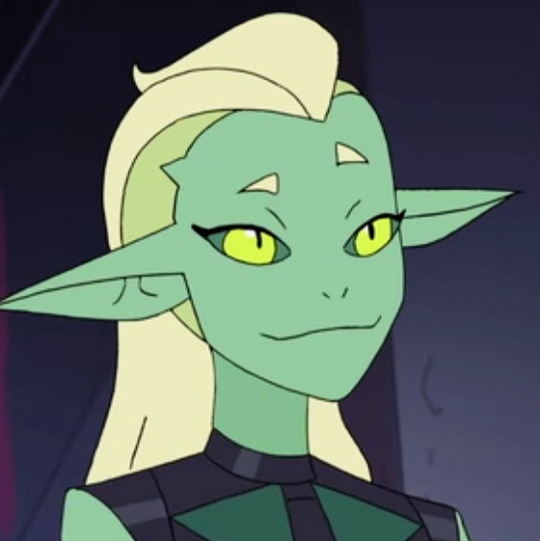
This is Double Trouble, from the children’s show “She-Ra And The Princesses Of Power”.
They identify as non-binary and use they/them pronouns. They’re also a slimy, duplicitous lizard-person who can change their shape at will.
Um, yeah.
Thanks, but no thanks.
Did I mention they’re also the only non-binary character in the entire show? And that they’re working with a genocidal dictator in most of the episodes they’re in?
Yikes.
Let’s look at another example.
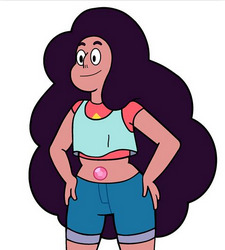
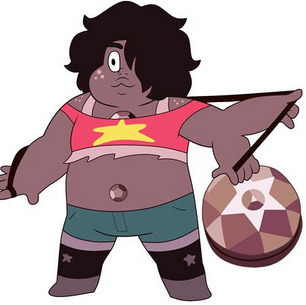
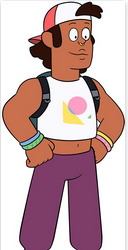
These three (in order of appearance) are Stevonnie, Smoky Quartz and Shep. Three characters appearing in the kid’s show “Steven Universe” and it’s epilogue series “Steven Universe: Future”.
All of them identify as non-binary and use they/them as pronouns.
Stevonnie and Smoky Quartz are the result of a boy and a girl being fused together through weird alien magic.
Shep is a regular human, but they only appeared in one episode. In an epilogue series that only hardcore fans actually watched.
Well, I mean...
One out of three isn’t that bad, right?
Maybe we should pick an example from a series for older viewers.
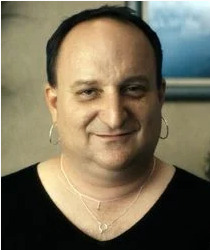
Say hello to Doppelganger, a non-binary superhuman who goes by they/them, from the Amazon-series “The Boys”.
They’re working for a corrupt superhero-agency and use their power of shape-shifting to trick people who pose a threat to said agency into having sex with them. And then blackmail those people with footage of said sex.
....
Do I even need to say it?
If you’ve paid attention during the listing of these examples, you might have noticed a theme.
Namely that characters canonically identifying as non-binary are either
supernatural in some way, shape or form,
barely have a presence in the piece of media they’re in,
both.
Blink-and-you-miss-it-manner of representation aside, the majority of these characters fall squarely under what we call “Othering”.
“Othering” describes the practice of portraying minorities as supernatural creatures or otherwise inhuman. Or to say it bluntly: As “The Other”.
“Othering” is a pretty heinous method. Not only does it portray minorities as inherently abnormal and “different in a bad way”. It also goes directly against what representation is actually for: Normalizing.
As a general rule of thumb: If your piece of media has humans in it, but the only representation of non-white, non-straight people are explicitly inhuman... yeah, that’s bad.
So is there absolutely no positive representation for us out there?
Not quite.
As rare as human non-binary characters in media are to find, they do exist.
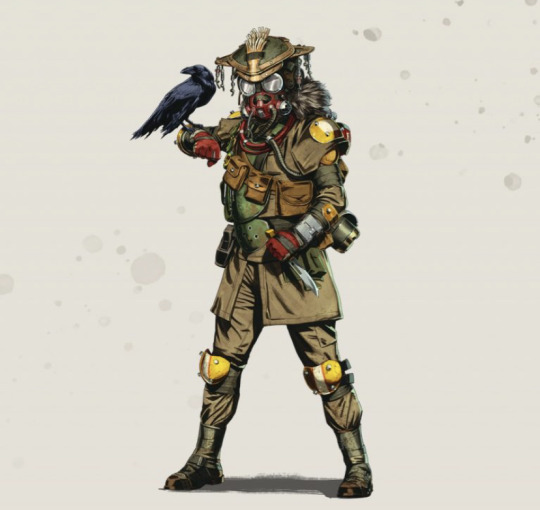
Here we have Bloodhound! A non-binary human hunter who uses they/them pronouns, from the game “Apex Legends”.
It’s been confirmed by the devs and the voice actress that they’re non-binary.
Nice!
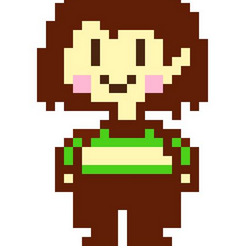
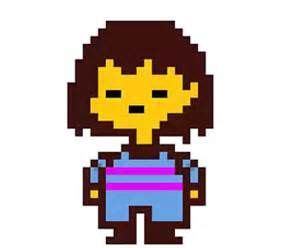
These are Frisk (bottom) and Chara (top) from the game “Undertale”. While their exact gender identity hasn’t been disclosed, they both canonically use they/them pronouns, so it’s somewhere on the non-binary spectrum.
Two human children who act as the protagonist (Frisk) and antagonist (Chara), depending on how you play the game. (Interpretations vary on the antagonist/protagonist-thing, to say the least.)
Cool!
......
And, yep, that’s it.
As my little demonstration here showed, non-binary representation in media is rare. Good non-binary representation is even rarer.
Which is why those small examples of genuinely good representation are so important to the Non-binary community!
It’s hard enough to have to prove you exist. It’s even harder to prove your existence is not abnormal or unnatural.
If you’d like to further educate yourself on representation, it’s impact on society and why it matters, perhaps take a second to read through these articles:
https://www.criticalhit.net/opinion/representation-media-matters/
https://www.pbs.org/newshour/arts/why-on-screen-representation-matters-according-to-these-teens
https://jperkel.github.io/sciwridiversity2020/
https://www.forbes.com/sites/quora/2019/05/22/why-is-equal-representation-in-media-important/?sh=25f2ccc92a84
https://www.theodysseyonline.com/why-representation-the-media-matters
3. So What’s The Problem?
The problem, as is the case with so many things in the world, is prejudice.
Actually, that’s not true.
There’s not a problem, there are multiple problems. And their names are prejudice, ignorance and bigotry.
Remember how I said human non-binary representation is rare?
Yeah, very often media-fans don’t help.
Let’s take for example, the aforementioned Frisk and Chara from “Undertale”.
Despite the game explicitly using they/them to refer to both characters multiple times, the majority of players somehow got it into their heads that Frisk’s and Chara’s gender was “up for interpretation”.
There is a huge amount of fan art straight-up misgendering both characters and portraying them as binary and using only he/him or she/her pronouns.
The most egregious examples are two massively popular fan-animated web shows: “Glitchtale”, by Camila Cuevas and “Underverse” by Jael Peñaloza.
Both series are very beloved by the Undertale-fanbase and even outside of it. Meaning for many people, those two shows might be their first introduction to “Undertale” and it’s two non-binary human characters.
Take a wild guess what both Camila and Jael did with Frisk and Chara.
Underverse, X-Tale IV:
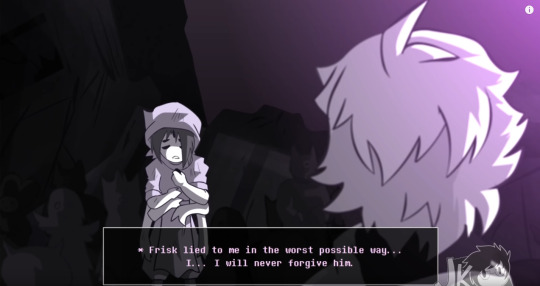
(Transcript: “Frisk lied to me in the worst possible way... I... I will never forgive him.”)
Underverse, X-Tale V:
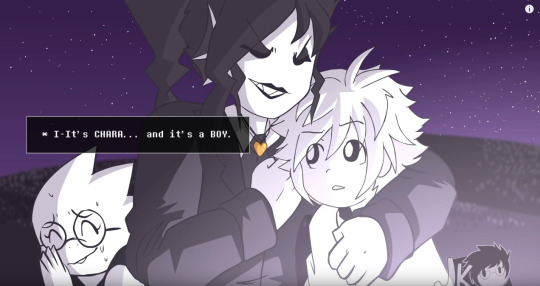
(Transcript: “I-It’s Chara... and it’s a BOY.”)
Glitchtale, My Promise:
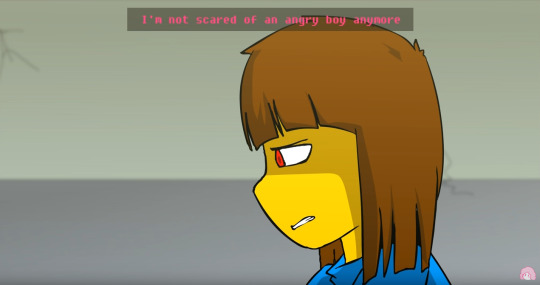
(Transcript: (Referring to Frisk) “I’m not scared of an angry boy anymore.”)
Glitchtale, Game Over Part 1:
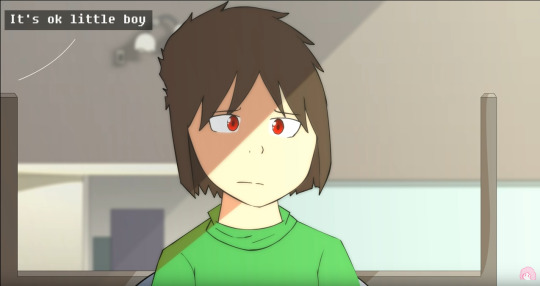
(Transcript: (Referring to Chara) “It’s ok little boy.”)
This... this isn’t okay.
Not only do both of these pieces of fan-art misgender two non-binary characters, the creators knew beforehand that Frisk and Chara use they/them-pronouns, but made the conscious choice to ignore that.
To be fair, in a video discussing “Underverse”, Jael said that only X-Tale Frisk and Chara, the characters you see in the Underverse-examples above, are male, while the characters Frisk and Chara from the main game remained non-binary and used they/them (time-stamp 10:34).
Still, that doesn’t erase the fact that Jael made up alternate versions of two non-binary characters specifically to turn them male. Or that, while addressing the issue, Jael was incredibly dismissive and even mocked the people who felt hurt by her turning two non-binary characters male. Jael also went on to make a fairly non-binary-phobic joke in the video, in which she equated gender identities beyond male and female to identifying as an object.
Jael (translated): “I don’t care if people say the original Frisk and Chara are male, female, helicopters, chairs, dogs or cats, buildings, clouds...”
That’s actually a very common joke among transphobes, if not to say the transphobe-joke:
“Oh, you identify as X? Well then I identify as an attack helicopter!”
If you’re trans, chances are you’ve heard this one, or a variation of it, a million times before.
I certainly have.
I didn’t laugh then and I’m not laughing now.
(Author’s note: I might be angry at both of them for what they did, but I do not, under any circumstances, support the harassment of creators. If you’re thinking about sending either Jael or Camila hate-mail - don’t. It won’t help.)
Jael’s reaction is sadly common in the Undertale fandom. Anyone speaking up against Chara’s and Frisk’s identity being erased is immediately bludgeoned with the “up for interpretation”-argument, despite that not once being the case in the game.
And even with people who do it right and portray Frisk and Chara as they/them, you’ll have dozens of commenters swarming the work with sentences among the lines of “Oh but I think Frisk is a boy/girl! And Chara is a girl/boy!”
By the way, this kind of thing only happens to Frisk and Chara.
Every other character in “Undertale” is referred to and portrayed with their proper pronouns of she/her or he/him.
But not the characters who go by they/them.
Their gender is “up for interpretation”.
Because obviously, their identity couldn’t possibly be canonically non-binary.
Sadly, Frisk and Chara are not alone in this.
Remember Bloodhound?
And how I said they’d been confirmed as non-binary and using they/them pronouns by both the creators and the voice actress?
It seems for many players, that too translated to “up for interpretation”.

(Transcript: “does it matter what they call him? He, her, it, they toaster oven, it doesn’t matter”)

(Transcript: “I’m like 90 % sure Bloodhound is a dude because he could just sound like a girl and by their age that I’m assuming looks around 10-12 because I’ve known many males who have sounded like a female when they were younger”)
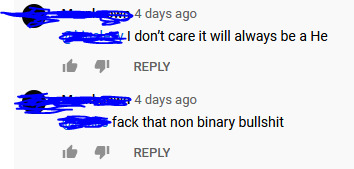
(Transcript: “I don’t care it will always be a He. F*ck that non-binary bullsh*t.”)

(Transcript: “Bloodhound is clearly female.”)

(Transcript: “I’m not calling a video game character they/them”)

(Transcript: “exactly. The face was never fully shown neither was the gender so I’d say it means that the player is Bloodhound. So it’s your gender and you refer to “him” as yourself. It’s like a self insertion in my eyes.”)
So, let me get this straight:
If a character, even a player character, uses she/her or he/him, you can accept it, no questions asked.
But when a character uses they/them, suddenly their identity and gender are “up for interpretation”?
This attitude is also widely prevalent in real life.
Many languages only include pronouns for men and women, with no third option available. Non-binary people are often forced to make up their own terms, because their language doesn’t provide one.
Non-binary people often don’t fit within other people’s ideas of gender, so they get excluded altogether. Worse, non-binary people are often the victims of misgendering, denial of their identity or even straight-up violence when coming out.
People will often tell us that we look like a certain gender, so we should only use one set of gendered pronouns. Never mind that that’s not what we want. Never mind that that’s not who we are.
Non-binary people are also largely omitted from legal documentation and studies.
We cannot identify as non-binary at our workplace, because using they/them pronouns is considered “unprofessional”.
We don’t have our own bathrooms like men and women do. Our gender is seen as less valid than male and female, so even that basic thing is denied to us. I’ve had to use the women’s restroom my entire life, because if I go into a male restroom, I’ll be yelled at or made fun off or simply get told I took the wrong door. It’s extremely uncomfortable for me and I wish I didn’t have to do it.
And since non-binary people aren’t seen as “real transgender-people”, we often don’t receive the medical care we need. This often renders us unable to feel good within our bodies, because the treatment and help we get is wildly inadequate.
It’s especially horrible for intersex people (people who are born with sex characteristics that don’t fit solely into the male/female category) who are often forced to change their bodies to fit within the male/female gender binary.
And you better believe each of those problems is increased ten-fold for non-binary people of color.
We are ignored and dismissed as “confused”, because of who we are.
Representation is a way for Non-binary people to show the world they exist, that they’re here and that they too have stories to tell.
But how can we, when every character that represents us is either othered, barely there or gets taken away from us?
We are not “up for interpretation”.
Neither are the characters in media who share our identity.
And it’s time to stop pretending we ever were.
For more information about Non-Binary Erasure and how harmful it is, you can check out these articles:
https://everydayfeminism.com/2015/08/common-non-binary-erasure/
https://www.dailydot.com/irl/nonbinary-people-racism/
https://nonbinary.wiki/wiki/Nonbinary_erasure
https://traj.openlibhums.org/articles/10.16995/traj.422/
https://medium.com/an-injustice/everyday-acts-of-non-binary-erasure-49ee970654fb
https://medium.com/national-center-for-institutional-diversity/the-invisible-labor-of-liberating-non-binary-identities-in-higher-education-3f75315870ec
https://musingsofanacademicasexual.wordpress.com/2015/05/11/dear-sirmadam-a-commentary-on-non-binary-erasure/
4. How Do We Fix It?
Well, first things first: Stop acting like we don’t exist.
And kindly stop other people from doing it too.
We are a part of the LGBT+ community and we deserve to be acknowledged, no matter what our pronouns are.
Address non-binary people with the right pronouns. Don’t argue with them about their identity, don’t comment on how much you think they look like a boy or a girl. Just accept them and be respectful.
If a non-binary person tells you they have two sets of pronouns, for example he/him and they/them, don’t just use one set of pronouns. That can come off as disingenuous. Alternate between the pronouns, don’t leave one or the other out. It’ll probably be hard at first, but if you keep it up, you’ll get used to it pretty quickly.
If you’re witnessing someone harass a non-binary person over their identity, step in and help them.
And please, don’t partake in non-binary erasure in media fandoms.
Don’t misgender non-binary characters, don’t “speculate” on what you think their gender might be. You already know their gender and it’s non-binary. It costs exactly 0 $ to be a decent human being and accept that.
Support Non-Binary people by educating yourself about them and helping to normalize and integrate their identity.
In fact, here’s a list of petitions, organizations and articles who will help you do just that:
https://www.change.org/p/collegeboard-let-students-use-their-preferred-name-on-collegeboard-9abad81a-0fdf-435c-8fca-fe24a5df6cc7?source_location=topic_page
6 Ways to Support Your Non-Binary Child
7 Non-Negotiables for Supporting Trans & Non-Binary Students in Your Classroom
If Your Partner Just Came Out As Non-Binary, Here’s How To Support Them
How to Support Your Non-Binary Employees, Colleagues and Friends
Ko-fi page for the Nonbinary Wiki
The Sylvia Rivera Project, an organization who aims to give low-income and non-white transgender, intersex and non-binary people a voice
The Anti Violence Project “empowers lesbian, gay, bisexual, transgender, queer, and HIV-affected communities and allies to end all forms of violence through organizing and education, and supports survivors through counseling and advocacy."
The Trans Lifeline, a hotline for transgender people by transgender people
Tl:DR: Non-Binary representation is important. Non-Binary people still suffer from society at large not acknowledging our existence and forcing us to conform. Don’t be part of that problem by taking away what little representation we have. Educate yourself and do better instead. We deserve to be seen and heard.
#non-binary#agender#demigender#gender identity#essay#erasure#lgbt representation#misgendering#undertale#she ra spop#apex bloodhound#doppelganger#steven universe
212 notes
·
View notes
Photo
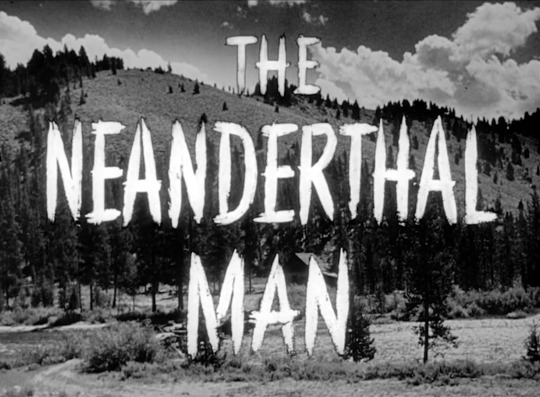
The Neanderthal Man
Since I'm taking a break from fishmen, I might as well let Bigfoot catch up a bit. The Neanderthal Man isn't exactly a Bigfoot movie, but it’s along the same lines and its entire starring cast has MST3K pedigrees. Robert Shayne was in Indestructible Man and Teenage Caveman. Richard Crane was Rocky Jones, Space Ranger! Beverly Garland was in Swamp Diamonds and Gunslinger. Even the composer, Albert Glasser, wrote music for Invasion USA, Last of the Wild Horses, and almost all of MST3K’s Bert I. Gordon movies.
Some little mountain town in the middle of the Sierras (which the Portentous 50's Narrator takes some trouble to tell us is a primeval place where 'the defacing hand of civilization has fallen but lightly') is having a rash of saber-toothed tiger sightings! At first these are laughed off, but when the game warden himself sees one cross the road in the middle of the night, it's time to do something about it. The warden shows a cast pawprint to Dr. Ross Harkness in Los Angeles, who is interested enough to come up and see for himself. Local Mad Scientist Dr. Groves pooh-poohs the whole thing, which is enough to tell me that we're not dealing with a local cryptid here. Somebody is making prehistoric monsters.
So... I may not have actually run out of movies, but I seem to be running out of plots, because this is a remarkably similar movie to Monster on the Campus. The major difference between the two films is that Dr. Blake turned himself into a caveman by accident, while Dr. Groves here is doing it on purpose.
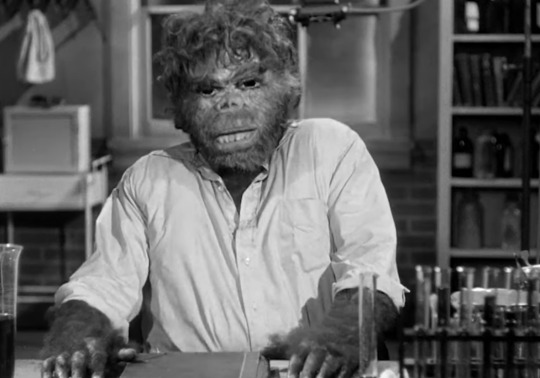
Another difference is that Monster on the Campus' story, while silly, was linear – events escalated in a way that felt logical, and there were reasons why things happened when and where they did. By contrast, The Neanderthal Man feels like a first draft. At the beginning of the film, we're dealing with the saber-toothed tigers that Groves has been creating by injecting cats with his de-evolution serum. We hear about these slaughtering game and livestock, and it seems like only a matter of time before they move on to human beings. The beginning of the film is quite upfront about the fact that Groves is responsible, too, as it is only mildly mysterious in its depiction of one of the creatures escaping his lab.
Sometimes the saber-tooths are represented by an actual tiger, usually filmed from behind or at a great distance so nobody has to put the prosthetic teeth on it. They do have prosthetic teeth, but they're only visible in a couple of shots. Imagine being at a bar and some guy tells you his job is sticking fake fangs on real tigers for a caveman movie! For close-ups, there's a hilarious puppet head that looks like the sort of thing you'd see mounted on a frat house wall as a joke. The director had the sense not to linger on this in motion shots, but later we see still photographs Groves has supposedly taken of his experimental subjects and they're even stupider-looking than we imagined.
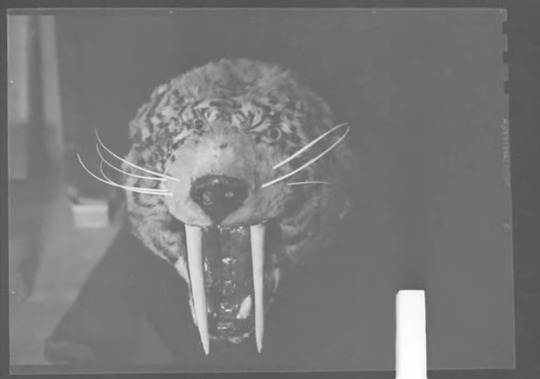
Anyway, this goes on for a while with rising action, as the game warden goes to get Harkness and they manage to shoot one of the animals, only to have it vanish from the kill site when they try to show it to Groves (the movie never bothers to explain how that happened, incidentally. The ending suggests that the creatures change back when they die, but there's definitely no dead kitty cat at the scene, either). The whole movie could easily have just had the cats and their creator as the antagonists, perhaps even ending the same way as Dr. Groves proves his work to the other characters by injecting himself. That's not what happens, though. Instead, the story mostly forgets about the cats one we find out Groves has also been carrying on human experiments.
(Before himself, Groves' first experimental subject was his disabled Latina housekeeper. Another series of photos show her half-transformed into a cavewoman who for some reason is wearing drag queen false eyelashes. And as long as I'm talking about the movie being gross and bigoted, there's a bit where a woman is violently raped. This happens off camera, but the audience is not allowed to entertain any illusions about it.)
The problem is that before we see him give himself an injection in the arm, we have had absolutely no indication that Groves has been giving his serum to anything besides the cats! Cats are stealthy, cryptic creatures and if one of those has been seen wandering around killing things, then surely a full-on caveman beating people to death would not be able to stay out of sight! If what we were seeing were the first time Groves had tried the formula on himself then that would be an explanation, but his notes reveal that he's been doing it for so long that he's on the verge of losing control of the transformation and permanently reverting to a pre-human status, as indeed he does for the climax. Much like the stupid dinosaur in The Beast of Hollow Mountain, the movie's main monster is given no build-up whatsoever!
There's worse yet, though. The main characters, Dr. Harkness and Groves' daughter Jan, are barely involved in the 'caveman' part of the plot. They get phone calls about the various murders that Groves is committing in caveman form, and they snoop around the lab to figure out things the audience already knows. The same story could have been told without them, perhaps with the game warden and the hunter as protagonists, and it would probably have been more interesting. The script also repeatedly has Dr. Groves wander in and bluster about how the tiger sightings are hallucinations and tall tales, which seems a little unnecessary when we already know he's responsible. The film-makers can't seem to decide whether they want us to know that or not.

Dr. Groves wears glasses. Maybe the reason his primitive alter-ego is angry and breaking shit (although it does politely open and close the window it climbs out of, which made me laugh) is because it can't see. This is also my theory about why the Hulk smashes, and what do you know? In Avengers Endgame he's got Hulk-sized spectacles and only smashes when he's told!
The direction of The Neanderthal Man can probably best be described as 'serviceable'. It shows us what's going on, but doesn't particularly add anything to the proceedings. The 'Neanderthal' mask is immobile and uninteresting, not much better than somebody's Party City Sasquatch costume. Even the eyes are just painted on, meaning the poor guy in the costume can’t do much because he can’t see where he’s going.
The dialogue is often very strange, with characters talking like they're in a Jules Verne novel. If only one person did this, it might seem like a character quirk – it works for Dr. Groves, for example – but it's everybody. Seeing the cat carcass is gone, Harkness declares, “I refuse to believe in the supernatural! There must be some logical cause and effect to this unholy adventure!” Groves' fiancee Ruth berates him for ignoring her, saying, “I want you, the man I once knew! The good companion, the cheerful friend. I want the happiness we once found in each other.” It's bizarre to listen to, and often audibly awkward for the actors.
Monster on the Campus was kind of trying to be about how humanity must choose to evolve away from our inner savage, although the finale didn't bear that out. There's a scene in The Neanderthal Man in which this movie seems to be trying to go in the opposite direction, saying that we were never savage to begin with. Dr. Groves is speaking to a panel of scientists about the size of the brain in various 'primitive' species of human. He points out that by the time we reached Homo erectus we were already working with four times the cerebral jelly of a chimpanzee, and argues that our ancestors would have been recognizably human in their behaviour and problem-solving capacity.
(Amusingly, his chart of human evolution includes Piltdown Man, which was proven to be a hoax literally a few months after this movie's release. What makes this even more tragic for the writers is that their list of primitive humans seems to be the only place where they actually did any research.)

The problem with Dr. Groves' theory is that he already knows it's wrong. We soon learn that he's been experimenting on himself with his serum for a while already, and his notes show that he knows very well he regresses into a near-mindless animal. The movie does not even try to reconcile these ideas. If Groves were continuing his experiments in the hope that perfecting his serum would give him a more accurate reconstruction of ancient man, that would be one thing, but the script never goes there.
So now that we've had two 'man turns into caveman by injecting science juice' movies, of course I have to ask which one is better. Monster on the Campus wasn't a good movie but it was definitely an improvement on The Neanderthal Man in several respects, and although I don't have any way to find out for certain, I suspect it was an intentional remake. It's definitely more entertaining and gets bonus points for including the Meganeura dragonfly, but nothing in it is nearly as funny as The Neanderthal Man's fake tiger head. I guess if you're gonna watch one or the other, stick to Monster on the Campus, but if you're gonna watch both, start with The Neanderthal Man and do them in chronological order, the better to spot the inspirations and references.
Before I go, a fun paleontology fact: current thinking is that the saber-toothed cat's eponymous fangs actually didn't show when it had its mouth closed! There are zero cave paintings or ancient sculptures of a saber-tooth cat with teeth visible, and when scientists looked at the structure of the enamel in the canines, it suggested that in life the teeth were hidden by big, fleshy, St Bernard jowls. Google 'smilodon lips' and behold how this looks fully three hundred percent more ridiculous than you're imagining. I love nature.
#mst3k#reviews#episodes that never were#the neanderthal man#tw: rape#50s#curiously caucasian cavepeople
21 notes
·
View notes
Note
On the topic of hphl - the plot is also so fucking yikes that at first I thought everybody was joking but no, they really did this and I'm just speechless, hphm has its problems with its plot but at least these are only plot holes or just straight up something stupid but not like this holy shit!
Yeah, I got a few responses about the plot, which confused me at first because I hadn't heard anything about the plot, didn't know any details had been released. Did a bit of digging and all I can find is that apparently it's about a Goblin Rebellion. Which does align with a couple of Asks that I got calling the game Antisemitic. Before I go any further, I just have to say...Warner Bros, Rowling, what the hell were you thinking? Like, you have to know this is a sensitive topic among the fandom, right? Were you trying to cause discourse? Trying to get the game cancelled before it's had any chance to turn a profit? Sometimes I think Rowling intentionally trolls her Antis, which I could almost respect (if, y'know, her Antis weren't against her because of the transphobia and stuff) but if you're actively trying to make money, why do this? Why ever touch the goblins again with a ten foot pole?
That said...okay, cards on the table, I am not Jewish. My opinion about this controversy is not the one that matters. But a small part of me is...ever so slightly optimistic?
As crazy as it sounds, let me explain. I don't think Rowling is consciously Antisemitic, she may not be at all. She's tranphobic as fuck, but being bigoted in one way doesn't mean necessarily mean you will be in another, and researching her past tweets...I suspect the way the Goblins turned out was an accident more than anything else. A result of Rowling not doing enough research. Speaking as someone who genuinely didn't know that Goblins began as Jewish caricatures until just a few years ago, I can buy that a writer crafting a fantasy series in the nineties would just see Goblins as another magical creature to include, like dragons and unicorns. I can believe that.
Either way, the Goblins are a part of the Potterverse now. The Goblin Rebellions are part of Wizarding History. There's no erasing that. There's no ret-conning it, (Then again, considering what's been done in the Fantastic Beast movies...) the best that can be done at this stage is to try and fix the awkward parts. I could just be a moron who needs to shut up about what they don't understand, and if so, then I will, without hesitation. But I'm genuinely curious to hear the views of Jewish bloggers and Potterheads as I present the (potential) silver lining here.
Here's the thing - we don't know much about the plot yet. We don't know how the Goblins will be portrayed. Rowling might let us down, as she has done quite a bit recently, but I doubt she's the only person working on the game. While she probably has final say over certain decisions, her co-workers could talk her into a more nuanced approach. Maybe the Goblins will be humanized more. We're seeing one of the Rebellions, maybe we'll see some examples of why they're so antagonistic to humanity? Maybe the game will let us choose to side with them? It's not impossible. The video game platform leaves a lot of doors open to flesh out Goblin culture from multiple angles, and I don't think this portrayal is necessarily doomed from jump.
Maybe it's just because, when I was a kid, I found the Goblins extremely compelling. (I was twelve, I had no conception of how they were problematic.) To me, they were one of the most interesting Potterverse creatures introduced, and for a while, they were my favorite. I remember going through a period of trying to get to know my culture better as a teenager (I'm Native American) and realizing that the Potterverse Goblins reminded me a lot of real world history. Of white invaders stealing and assimilating the culture of the tribes they conquered - which I think is reflected in how Wizards don't allow Goblins to carry wands, and blatantly ignore/disrespect Goblin culture by trading around Goblin-made treasures, even though this is tanatamount to theft. In Deathly Hallows, Griphook "double-crossed" the Golden Trio, but only because he knew they were going to do the same thing to him, and beat them to the punch. Harry ended up proving his suspicions entirely right. Again, it might just be me...but if Griphook was supposed to be the antagonist of this exchange...that didn't land. At all.
So what's my point? That if we get more individual characters like Griphook, and less of the Goblins being portrayed as a collective stereotype...this could be worth it. Could be. Nothing is set in stone yet. And Rowling has disappointed us time and again, so I probably shouldn't get my hopes up. The game could be antisemitic garbage. And on top of that, maybe it wouldn't even matter. Maybe any attempt to redeem the Goblins will only cause more damage. That's a possibility as well. I could always just be a naive idiot hoping that their favorite series can grow beyond it's more shameful parts. But even if they can be redeemed, I don't think the general fandom (to say nothing of the Jewish Potterheads) really want anything to do with the Goblins anymore and would no doubt just prefer they get mentioned as little as possible. It's a sizeable aspect of the Potterverse and I'm sure Rowling doesn't think they're offensive, so she sees no reason to ignore them...but I'm hoping, praying, that the other developers of the game are able to stop her and explain how things could be taken, so she makes different choices or allows for different choices to be made.
#Under the cut we have#The Ramblings of a Mad Cat#Talking about that which they understand very little#Most likely#Harry Potter#Harry Potter: Hogwarts Legacy#HPHL#J.K. Rowling#Potterverse Goblins#Griphook
5 notes
·
View notes
Photo
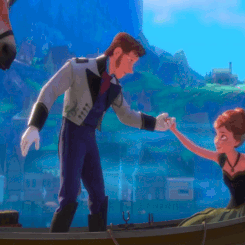


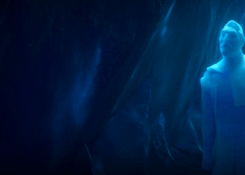



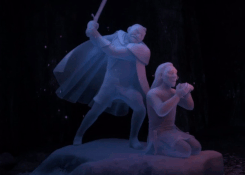


The Men with Two Faces
When Frozen was released almost seven years ago, I fell in love with it and the love hasn’t stopped since, especially with the following of Frozen Fever, Olaf’s Frozen Adventure, and last year’s Frozen II. I am very proud to be in this fandom and have enjoyed expressing my love for it by writing analyses about them, and my friends and followers can rest assured I will never stop doing it, especially as long as there is more material for me to discuss! 😁😁😁
One of the reasons I fell in love with Frozen was because of Hans and the fact that he was a surprise villain. Disney introduced him by making us think he was another typical heroic prince: benevolent, noble, brave, caring, selfless, and kind. Hans tells Anna that he is the youngest of 13 sons from the kingdom of the Southern Isles, and in being the youngest, he has apparently faced ignorance, neglect, and abuse from most of his brothers, if not his entire family. But then in the third act, we discover that Disney had purposely misled all other characters, and even the audience, about who Hans really is. He reveals himself as a truly ruthless, sadistic, dishonest, power-hungry, selfish, two-faced sociopath whose only goal is to become king and gain the status, power, admiration, and respect he apparently never received from his family, and would never gain as the 13th heir of the Southern Isles. So he plotted to take control of Arendelle by marrying into the throne. He initially wanted to marry Elsa just because she was the oldest and rightful heir, which would give him a legitimate chance to become king. However, he decided to pursue and marry Anna when he realized that Elsa was an antisocial recluse, and planned to kill Elsa to get her out of the way and rise to power with him as king and Anna as his queen.
When I first saw Frozen, I was very shocked that Hans was the true villain, though at the same time, there were a few moments that made me suspicious of him. After seeing the film a few more times, I realized there were subtle clues of his villainy in many of his preceding scenes, so his villainous revelation did not come totally out of the blue. But Disney using the twist and idea of having a hidden main antagonist, one that was a prince, who is stereotypically a heroic character in fairy tales, no less, was something I very much enjoyed about Frozen because it was something so new, different, unexpected, and very unique, particularly for a Disney fairy tale.
When I saw Frozen II, I wasn’t expecting it to have a villain, hidden or not, since the trope of surprise villains by Disney, which started with Wreck-It Ralph, had been waning and it was getting easier for me to figure out who they were. Needless to say, when Runeard was revealed to be the film’s main antagonist, I was very shocked. I wasn’t shocked in the same way I was when Hans revealed himself to be an evil prince, but for different reasons. For one thing, Runeard only appears on screen as a living character during Agnarr’s story about the Enchanted Forest in the prologue, then as a snowy ice figure Elsa discovers in Ahtohallan years after his death. He has the shortest time on screen than any other villain in the Disney animated canon, yet Runeard also has a major effect on the film’s plot. He is one of the few Disney animated villains who affects the flow of the story from the very beginning, and is rather unique in doing so because he is a POSTHUMOUS main antagonist, the first one from Disney animation. In fact, Runeard is the Greater-Scope Villain of the Frozen franchise as his heinous actions against the Northuldrans not only led to the main events of Frozen II, but also to what became of his bloodline and what led to the events of Frozen. The fact that Runeard has such a short time on screen while simultaneously impacting so much to the story makes his actions even worse than those of Hans.
While the revelation of Runeard being the main villain has received mixed reception from fans and critics like that of Hans did, I can still focus more on the positive about the former’s villainy than the negative. Heck, when you look at both films and both of their main villains, Runeard and Hans actually have quite a lot in common, even though Runeard is far less developed as a character and has a much shorter amount of time on screen than Hans.
Both are monarchs who present themselves as kind, generous, noble, charismatic, benevolent people to the public, while in private, they reveal that are really nothing but cold, obsessive, ruthless, sadistic, two-faced men who are successful in concealing their true dark natures in order to gain the trust of others for their own selfish interests and benefits. In fact, when they make their first appearances in their respective movies, Hans and Runeard wear their benevolent masks when they meet with people, and both are wearing gloves as they do so.
Both prove themselves to be very competent rulers of Arendelle (though Runeard was a true king of Arendelle while Hans briefly acted as its reigning monarch in both Elsa and Anna’s absence), and are kind and generous towards the people of whom they are in charge. In truth, however, both they are very power-hungry individuals who do not care for anything except the power they have/crave, and are willing to do whatever it takes, including treachery and murder, to get what they want and expand their power.
Both have brief scenes in which they reveal their true colors to a single person and sadistically smile as they explain how the plans they have set in motion will be carried out and satisfy their ruthless, selfish desires. The difference between them is that Hans reveals his secret to Anna as he indirectly attempts to murder her, while Runeard reveals his secret to his second-in-command and doesn’t try to murder him (though he apparently instilled fear into the officer and swore him to secrecy over the true purpose of the dam’s construction).
Both plan to kill people who they see as being in their way and a threat to their goals. They sneak up on their victims when they (the victims) are seated on the ground (Hans on Elsa, Runeard on the Northuldra leader) and raise their swords over the victims’ heads, ready to murder them. As I said in “Striking Resemblances”, the difference between both moments is that while Hans failed to kill Elsa due to Anna’s intervention, Runeard succeeded in killing the Northuldra leader because no one else was around to witness and intervene.
And while it’s not part of their characters and actions within the movies, both mens’ true natures were kept a complete secret from viewers prior to the release dates of their respective films, especially during promotional material. Hans was labeled as “The Nice Guy” in the first theatrical trailer for Frozen, while Runeard was completely omitted from pre-release storybook merchandise, and Jeremy Sisto was revealed as the voice of the character for the first time at the world premiere of Frozen II.
The fact that Runeard killed the leader of the Northuldra while Hans didn’t kill Elsa suggests that Runeard is potentially a darker example of what Hans could have easily become if he had succeeded in his goal to kill both sisters and become king of Arendelle. But in the months since Frozen II came out, another possibility on how Runeard is suggested to be a darker reflection of Hans, with the former having succeeded in the past where Hans failed in the present, has been suggested by fans. As I’ve said before, Runeard was the founder and first king of Arendelle. Prior to this accomplishment, perhaps like Hans, he was once a prince who was overlooked and neglected by his family, and he craved power, respect, and admiration after having never received them from his family and/or the majority of his kingdom. Or perhaps Runeard was just a commoner, a poor nobody who still craved power and respect after never having received it, or even anything fine and desirable, in his life...and he ended up getting what he wanted when he created his very own kingdom and was proclaimed its king. AND when he became king, Runeard was set on expanding as well as protecting his power, with his only concern being his own status as a monarch.
Runeard and Hans both have underdeveloped backstories as villains and what makes them as such, even though it feels easier to figure out that of Hans based on what he does reveal to Anna. But considering how much they do have in common, perhaps Runeard WAS once in the same position Hans used to be, and he managed to succeed where Hans did not. With all we do know about them, though, Runeard appears to be far more evil and despicable than Hans, given his bigoted, judgmental, paranoid, hateful behavior towards the Northuldra and the magical spirits and his actions against them.
Hans briefly gets his chance of being a leader when he takes over as temporary ruler of Arendelle in both Elsa and Anna’s absence. He successfully wins the hearts of the Arendellians by acting as a kind, caring, benevolent ruler during the harsh conditions brought on by Elsa’s magical winter. The fact that he earned the trust and respect of the Arendellians and acts very competent as a ruler suggests that Hans really could have been a very good king. However, as I said in “Tyrant Terror”, while Runeard was revealed to be a ruthless, power-hungry, obsessive king in secret, he used the same kind of benevolent mask that Hans used when he appeared in public. Runeard apparently was also very competent as a ruler since he knew how to run the kingdom while pretending to be a noble leader to the public. He led the citizens, the guards, and the castle staff on to believe that his kind facade was his true nature.
Because getting power and respect for himself was all that both men ever really cared about, I have absolutely no doubt that, had he succeeded in stealing Arendelle’s throne, Hans also would have become the same kind of secretly ruthless, power-hungry, selfish tyrant that Runeard was before him.
Now the biggest difference between Hans and Runeard’s villainy is what motivates them to carry out their evil plans. Runeard seeks to destroy the Northuldra because they have ties to magic, something he detests, fears, and towards which he holds bigotry, since he believes it to be a threat to his royal rank and authority. The fact that the Northuldra are peasants who follow magic rather than a government ruled by a king is also how Runeard saw them as a threat. He presumably believed that the Northuldra might try to use their magic to one day plot to usurp him and take over his kingdom. Consumed by his hateful, bigoted, and paranoid feelings towards the tribe and their magic, Runeard decided to destroy them to prevent any chances of them trying to destroy him first.
In Hans’s case, he obviously viewed Elsa as a threat to his plans since she was the legitimate heir of Arendelle, and he plotted to kill her to get her out of his way. When Elsa accidentally revealed her powers and caused the eternal winter, Hans was just as shocked as everyone else. However, while his motive to kill Elsa expanded so that he also wanted restore summer to Arendelle (and appear to be a hero in the eyes of the Arendellians for doing so), Hans was always presumably indifferent to Elsa’s powers. Throughout the whole movie, he never once shows any true feelings of prejudice towards magic or fear that her magic makes Elsa so powerful that she is a greater threat to his goal of taking over her kingdom than he initially believed. The best example of this is when he reveals his true nature and plans to Anna, who says “You’re no match for Elsa!” and Hans callously retorts “No, you’re no match for Elsa!” Hans knows that Anna means that Elsa is more powerful than him with her magic and she could use them to bring him down, but Hans is completely unconcerned and unconvinced about this concept. If anything, by this time, he has realized that Elsa was scared of her own power and of losing Anna...and he knew how to use both of her fears against her.
So unlike Runeard’s fear of magic being his overall motivation to destroy the Northuldra, I don’t believe Hans ever feared or was prejudiced towards Elsa for being magical. He only wanted to kill her just because she was in his way of gaining access to Arendelle’s throne.
As with any Disney villain, though, in the end, Hans and Runeard’s confidence and arrogance ends up being their downfall, and they end up being forever ruined due to their actions. Hans extinguishes all heat sources in the library, then locks Anna in so she will die from her frozen heart. But because Olaf helps her escape the castle, Anna intervenes in the nick of time when Hans attempts to kill Elsa. After the winter is lifted, Hans is humiliated and defeated when Anna reveals that she survived, and many witness the punch she gives him to his face. Hans is then apprehended, imprisoned on a French ship headed back to the Southern Isles, and banished from Arendelle forever. He is later shown working in the royal stables in his kingdom, cleaning up after the horses.
Though he makes no further appearances in the franchise, Hans’s betrayal has undoubtedly ruined him forever and he will probably never be allowed to leave his kingdom in order to try his plot all over again. Furthermore, the allusions to and mentions of him in the sequel shows that he will never be forgiven by Elsa, Anna, and their family.
Despite having succeeded in murdering the tribe leader, the war that Runeard instigates leads to him falling off a cliff to his death and causing the angered spirits to cast a mist over the Enchanted Forest, trapping the people, including his surviving soldiers, in it for decades. Though he is long dead by the time the main events of the story take place, what remains of Runeard’s evil reign is finally brought to an end when Anna and Elsa destroy the dam. This act lifts the mist and frees the Forest, and a true union of peace is at last established between Arendelle and the Northuldra.
In life, Runeard had been desperate to protect his power, status, and legacy from being ruined by the Northuldra and their magic. But in great irony, his misdeeds caused his own fear to become reality (though not like he had envisioned), and his legacy is now forever ruined by his betrayal.
#Frozen analyses#Frozen 2 analyses#Disney#Disney Frozen#Disney Frozen 2#Frozen#Frozen 2#Hans#King Runeard#Disney Villains#Disney Villain#villains#villain#evil prince#evil king#two-faced characters#similarities#differences#my stuff#mine
155 notes
·
View notes
Text
Gallifrey Relisten: Lies
In the chaos of.....all of November....totally forgot I meant to relisten to this episode sooner! Which is odd because Series 2 is definitely one of the high points of Gallifrey for me (apparently listening to everything slowly collapse into the civil war is super engaging and interesting? idk Series 2 just does a lot of solid character work and storytelling and good narrative progression to the “ahhh everything is very bad” finale...and I’m not sure how to feel about this, given *gestures at the world these days*). But anyways, now for some thoughts on the series opener:
Fun fact: From the TV show alone, Romana I was my favorite. (This had something to do with her having more character growth in season 16 than season 17, since her early days on the TARDIS involve the “wait my academic success does not necessarily translate to the real world” realization and learning about worlds and people different from her own and growing from High-Achieving Student to Adventurer in her own right. Also I loved the grudgingly-working-together to actual-friends arc with her and the Doctor. I was a bit less interested in her character when she was just going around being a capable adventurer, although I did become invested in Romana II in her last episodes, as she quietly grapples with the issue of what she wants to do next in life and eventually chooses to go off on her own. Also to be fair, I appreciate the fun times of Season 17 a lot more now because Romana being happy and having a good time traveling around the universe? What a concept.)
All this to say: me on my first listen of Gallifrey was very excited about Romana I being in this episode. And even though it’s not quite as much of a !!!!! thing for me these days (the Gallifrey audios have long since solidified Romana II as my favorite), I do love the (sort of) multi-Romana interaction that happens in this one.
Brax essentially going “yeah the education system is supposed to be shitty and take an emotional toll on you” sir.
“I am not xenophobic” — Oh yeah, this scene is Narvin at his most unlikeable. “I’m not being bigoted, I’m just trying to protect Gallifrey, the fact that I assume that people who aren’t from here inherently can’t be trusted, and also go on about how they’re too loud and disruptive and don’t belong is definitely not a bigoted worldview nope.” Yikes. Very glad he’s going to see the error of his ways.
The Narvin and Darkel rant session does actually do a good job at explaining what’s been happening and establishing the primary conflict of the series while not feeling like it exists solely to be an info dump to catch up the listener. Like, it’s definitely a setup scene, but it is an interesting setup scene.
“But she is my President, and it’s my job to ensure that she gets what she wants and needs, efficiently and without question. Well, too many questions anyway.” Okay this moment and Darkel and Wynter’s conversation later about Narvin’s weakness (“Loyalty. An unswerving loyalty to his office and his precious CIA. And above all, loyalty to his president.” “He despises President Romana!” “Oh yes, of course. But it’s the position, not the person, he places that trust in.”) are really setting up some key Narvin Character Theses that we’re going to see play out this series (and also that the narrative is going to push in really interesting ways later on..... “position not the person”.....just you wait....)
Darkel and Narvin being indignant that Romana changed the law is just....hilarious in a kind of horrifying way? Oh no, the President worked with the legislative body to actually get a law passed. The horror.
“She has a temper. And a very long memory.” This is definitely about the CIA trying to overthrow her in Neverland but uhhh also it’s about Etra Prime and the Powers That Be on Gallifrey never making a serious effort to save her (at least from her perspective).
Yeah Darkel as antagonist is a bit abrupt (not that I particularly mind, she’s a good enough “love to hate” character that her not being set up as an antagonist from Series 1 doesn’t really bother me). But yeah, not sure what was going on behind the scenes, but it doesn’t seem like in Series 1 the plan was for her to be the primary Series 2-3 antagonist.
Darkel to Narvin: “You will let me know when you’ve decided.” Ooh yeah, this moment is quite a good setup of Narvin’s arc throughout this series — he has to decide where his loyalties truly lie.
Wynter is really interesting as far as character dynamics go, because he breaks the whole “Romana and Leela are the youngest people in the room” vibe — and it is just really interesting to see Romana interacting with this quite young Time Lord and specifically compare/contrasting it to how she interacts with young Time Lords in the later series when she’s older and a bit more emotionally mature and has more of the “mentor figure” vibes. (There isn’t really a conclusion to this thought, it’s more of a “huh, I’m thinking about this now” thing.)
“It’s been seven weeks, Andred. It’s hardly a lifetime.” Romana: please you have not been in a cell for that long, calm down.
“I thought you two were friends.” “A president of the High Council of Gallifrey cannot allow herself the luxury of friends.” Ahhhh, where it begins!! I’m extremely weak for the arc of Romana opening herself up to friendship and love, what of it.
Honestly, Andred’s politics have always been very confusing to me? And it probably doesn’t help that the show is all “he’s fully Andred now” but also “he lived as Torvald a long time and that’s still influencing him.” Like both of those things can be true, but it’s a bit unclear what Andred’s true priorities and motivations really are right then — and honestly, it just comes off like his primarily desire is to be useful to someone, and be granted some form of autonomy/power/respect in return (aka he doesn’t have any real clear principles that are motivating him). Also complaining about Romana opening Gallifrey up to aliens is such a bad look dude.
Romana to Andred: “I control your future. I control whether you have one.” Umm???? The foreshadowing?????
Andred, no. Andred, the free time pun was too much.
“I wish I had databanks. With a flick of a switch I could turn myself off, become unaware of all that has happened.” Leela ahhhhhhhhhh. (The desire to give Leela all the hugs and emotional support is very very high throughout these next couple seasons especially.....her mental health is in such a rough place ahhhh.)
Andred regenerated “nearly six months ago” and it’s been six and a half (or seven, depending on which character is speaking) weeks since A Blind Eye, which took place an unspecified amount of time after The Inquiry, which took place two weeks after Square One...(don’t mind me, just taking some notes on the timeline math...)
I believe a couple times in the Gallifrey audios, they reference the position of “Vice President,” which is very weird because that doesn’t seem to be a position that exists?? Chancellor is definitely seen as the #2 spot?? Idk what’s going on here.
“You are appreciated, highly regarded, and were I to lose you I would be...disappointed.” Romana, you started strong and then you got a bit emotionally repressed there.
“Torvald was a fool, but he was my fool.” .....I am not saying anything.....I will not be commenting on the Narvin and Andred scene......I just.......you know. There are some fics you cannot unread.
Romana does really trust Brax here, doesn’t she. And she really doesn’t trust easily post-Etra Prime, so this is a big deal — making it all the rougher when she (in the short term) finds out he meddled with her memories and (in the long term) has to deal with him doing things like temporarily betraying her for the greater good of protecting her while not explaining at all what’s really going on.
Okay, yes the whole pearl-clutching about Romana changing the laws is kinda silly and horrifying in a “how dysfunctional is your society if passing one (1) law is drastic change??” way, but also the flip side of this, aka “we thought these things were entrenched as norms in our society and would not change and then here comes along one president who’s trying to undo all of these things and threaten the whole system”.....y’all that hits differently now in the month November in the year 2020. In the Gallifrey audios the context is different — they are for sure overreacting to Romana’s very mild idea of “perhaps....we could change some things about society” but the way they talk about her political changes in the episode — feels a bit too close to home!
Romana’s voice right when she sees Leela....she missed her.....
Pandora being the “first female president” is a very weird and very unnecessary bit of misogyny? Ah yes, we must specify that this ancient president of Gallifrey who was wildly power-hungry and cruel and went too far and almost ruined everything Gallifrey had built was a woman?? Why was that bit of dialogue needed?? Tbh early Gallifrey does have a problem in general with characters played by women tending to be power-hungry....which is partly down to the fact that they have so so few women in the cast in general, it’s Romana, Leela, and Villains, mostly. (The lack of women in the supporting cast in early Gallifrey is going to be an ongoing complaint.)
“You should not be afraid of your feelings, K9.” / “Yes, thank you, if we can move on from the emotional support group session.” Pffffff
I do choose to ignore the implication that Romana returned to Gallifrey and became President because of the subconscious influence of Pandora/the Imperiatrix Imprimatur nudging her towards power. Tbh it’s simply not interesting to me to have such a pivotal character choice reduced to genetic/subconscious manipulation. Yes, Romana ended her TV run insisting she didn’t want to go back to Gallifrey (and even staying in another universe to avoid it), and yes, it creates this initial emotional dissonance suddenly jumping to stories where she’s President of Gallifrey. But I already did the headcanon work before I jumped into Big Finish to make it work for me, I didn’t need this weirdness.
Elaborating on this a bit more: There is something interesting to me about a person who left home and slowly ended up rejecting the narrow worldview she grew up with, cutting herself free from the place she was born — and then eventually choosing to return because she genuinely wanted to make that messed-up world better and believed she could. And it also creates a really interesting contrast with the Doctor: two Time Lords who came to realize that Gallifrey was pretty terrible actually, and one of them kept running away from it and rejecting Time Lord society, and the other came back and said maybe I can change things. Because both are understandable and complicated reactions to have to a messed-up home world, and there are different ways of trying to do good. And regardless of how her choices turned out, I always liked the idea that it was Romana’s own choice that brought her to Gallifrey again, and I don’t think Pandora needed to be shoehorned in to explain her actions.
Okay, I want to hear the follow up where Leela insists Romana tell the whole Key to Time story after hearing all of these random out of context bits and pieces.
Why does Brax admit to breaking the Laws of Time? The fact that he’s in contact with his past/future selves isn’t actually relevant to what he needs to tell Narvin? He literally could have just said that he hypnotized Romana, without mentioning that it was his future self who did it? (Also, it’s implied in this one that he pushes for Romana to use the mind wipe on Narvin because he wants the memory of that reveal erased, but somehow that’s the one thing that Narvin keeps because he uses that information against Brax later? Aka: how did Narvin remember that Brax told him this?)
And final thought: general internal monologue during this episode is just: Pandora arc Pandora arc Pandora arc here we go!! Because the Lies through Warfare run is really one of the more interesting bits of Gallifrey for me (Imperiatrix specifically ranks very high on my favorite episodes list), and I’m excited to be re-listening to/thinking about/hearing other people talk about these episodes!
Next Episode Reaction: Spirit
Previous Episode Reaction: A Blind Eye
#gallifrey audios#romana#leela#narvin#irving braxiatel#going to listen to the pod of rassilon episode on a long car ride tomorrow (well. today at this point) so very excited for that!#ramblings#emily listens to big finish#the relisten of rassilon
11 notes
·
View notes
Text
12 Angry Men: The Characters
While 12 Angry Men has a remarkably small cast for a motion picture, the problem is that twelve of the cast members happen to be main characters.
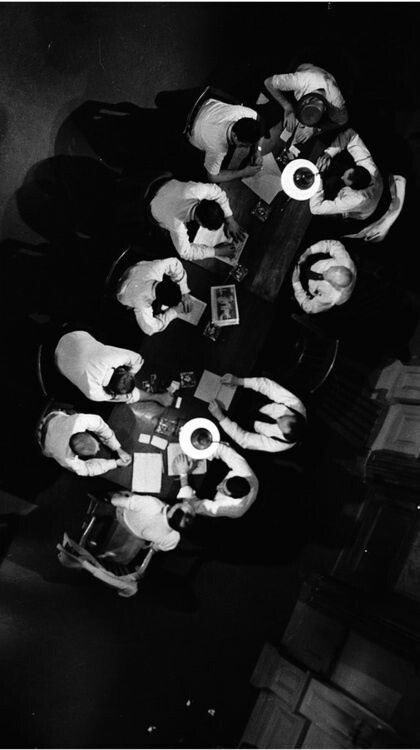
Twelve is a large number of main characters to balance out, especially when you only see them over the course of one day, in only one setting. The writers had the challenging job of making each character unique enough that the audience doesn’t mix them up, and while some of them are more distinct than others, each character is different enough so that the viewers can tell them apart.
As a result, 12 Angry Men is left with a surprisingly large main cast, full of characters that are neither infallible heroes, nor despicable villains. Much like Casablanca, it would seem like this film has an issue deciding a protagonist, as the character who would seem to fulfill this role, Henry Fonda’s Juror #8, doesn’t have a ‘problem pertaining to the plot’ that’s unique from any of the other characters. They all have the same problem: they need to come up with a verdict. And indeed, this film would seem to be without a true protagonist if not for another element: the protagonist’s reaction towards the problem.
You see, while every other character begins the story either certain of the boy’s guilt, or just wanting to say they are so that the jury ordeal can be over with, it is only Juror #8 who believes that the case deserves a closer examination.
As you may have guessed, today, we’re going to be examining the characters of 12 Angry Men, starting with our protagonist: Juror #8. Let’s take a look. (Spoilers below!)
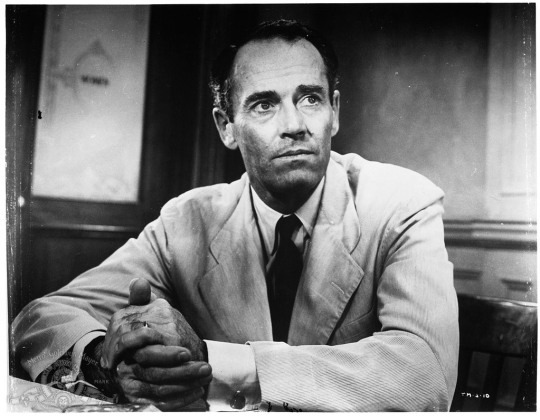
Juror #8 is a rather interesting protagonist in that, as I mentioned in previous articles, he could be any one of us. He’s the ‘hero’ of the story, not because of any great feat, but because he was logical and thoughtful enough to take his job as a juror seriously enough to put real thought into the case at hand. This is not a story about a man who is certain of his correctness, this is a story about a man who is uncertain about someone’s guilt, and there is a huge difference. From the moment of his Establishing Character Moment of quiet reflection at the window, he’s in action to make sure that he, and the rest of the jury, comes to a fair, if not right, conclusion.
Juror #8 never claims he is right, merely that he has reasonable doubt that leads him to believe that he might be right. He wants to talk about the verdict, he wants to be careful, because a life is on the line. He takes his responsibility seriously, and that, at first, is what sets him up as our protagonist. It is his vote of ‘not guilty’ that gets the plot going proper, for without him, the film would have come to a whopping, depressing, ten minutes tops.
So, we know Juror #8 is responsible, and tries to be moral. What else do we know about him?
For one thing, he’s sharp.
Juror #8 knows that he can’t convince anyone to change their vote without some good evidence, which he brings and addresses. Bit by bit, he chips away the certainty around the testimonies, alibis, and evidence, bringing up arguments and doubts about the elements of the case that the other jurors are absolutely certain about. He’s quick to figure out people’s angles and point out flaws in logic, and he’s not afraid to call out someone’s bias. His exchange with Juror #3 proves this, as Juror #8 accuses him (rightfully so) of wanting to kill the defendant due to personal reasons.
Juror #8 is a Guile Hero, using his wits and brains to pick apart the evidence, the original Rogue Juror archetype, wanting to take his time to get through the facts. He cares about getting to the bottom of the facts, and he wants to get the other jurors on the side of justice as well.
Wait a minute, you say. I’ll buy that he’s the ‘hero’, but protagonists are supposed to change by the end of the story. There’s no sign of that at all!
Honestly, you’re right.
Juror #8, while clearly being the ‘hero’ of the film never seems to ‘change’ by the end of the film. In fact, he is the only character not to change, in vote as well as action. So what are we to make of that?
If the rest of the cast were as immovable as Juror #8, I would agree that his ‘protagonist’ status would certainly be called into question, and we may indeed be left with a protagonist-less film, however, there is one element that prevents that from happening: the fact that the other jurors do change their minds.
He’s the grounding element for the audience, courageous and standing for human decency. The point of his character is that he’s unyielding, unchanging in the face of peer pressure. It is in his influence, his changing of the other characters, that his test as a protagonist comes.
Of course, he succeeds, but the road is difficult. The first ally rallied to his cause, after a few minutes of deliberation, is Juror #9.
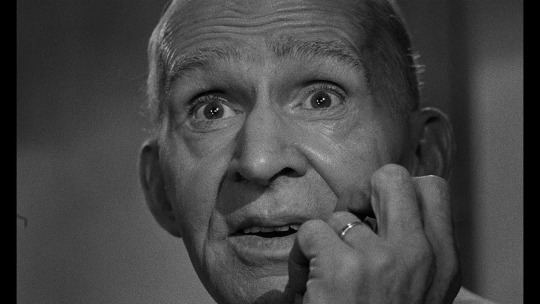
Juror #9 (Joseph Sweeney) is an observant Cool Old Guy, the Lancer to Juror #8. His abilities in Awesomeness by Analysis play a huge part in convincing the remaining jurors to change their votes, by standing with Juror #8 against the pressure and displaying a great deal of insight and sympathy. He’s also possessing of some pretty progressive ideas, not being bigoted like some of the younger jurors around him. While needing some thought before changing his vote, Juror #9 is not afraid to speak his mind and morality, making him a valuable ally in changing the course of the vote.
Leading us to the next vote change: Juror #5.
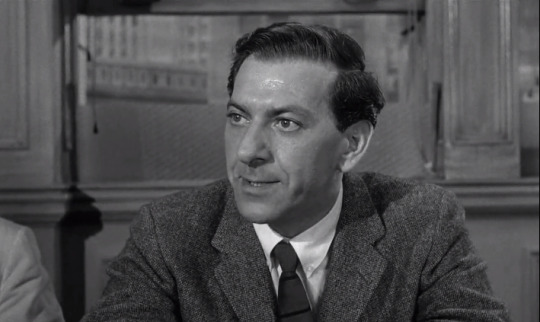
Juror #5 (Jack Klugman) has a bit in common with the defendant, coming from a similar background. He also grew up in the slums, and takes it quite personally that some of the jurors think that that’s suitable explanation for murder. He’s an invaluable addition, as it is his experience witnessing knife-fights that leads to the debunking of the grip necessary for the boy to have murdered his father. He’s a Nice Guy from a rough neighborhood, and ends up producing some key points in favor of the Not Guilty verdict.
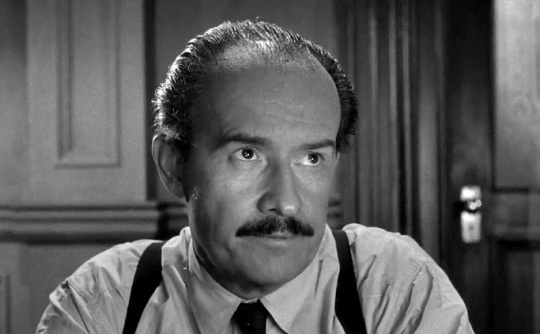
Next to switch his vote is Juror #11 (George Voskovec), a man with Immigrant Patriotism, faith in the American dream of democracy and justice. The ‘Token Minority’ of the twelve, Juror #11 begins thinking of, and asking his own questions that can’t be satisfyingly answered with the evidence given. He’s a polite man, with a great concern with being fair and upright. In fact, it is one of his lines that best sums up the point of the film:
“We have a responsibility. This is a remarkable thing about democracy. That we are … what is the word? … Ah, notified! That we are notified by mail to come down to this place and decide on the guilt or innocence of a man we have not known before. We have nothing to gain or lose by our verdict. This is one of the reasons why we are strong. We should not make it a personal thing.”
He is here to remind us of the seriousness of jury duty, the importance of justice and fairness. His character warns us not to take our privileges for granted, something that we need to be reminded of. He is strong-minded, of strong character, and strong-willed
Leading us to the next switch in votes: Juror #2.
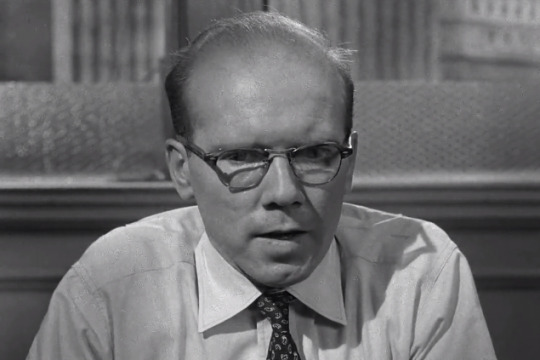
Juror #2 (John Fielder) is a timid man who doesn’t seem to have much of a backbone at first. He’s an Extreme Doormat, unable to really explain his opinions, tending to go along with the tide at first. As the film progresses, he does grow more of a spine, later evidenced by bringing up the question of the stab wound, which had been bothering him. Had he been more timid, there’s a possibility that the vote might have swapped once more, and Juror #8’s cause would be lost.
Then there’s Juror #6 (Edward Binns).
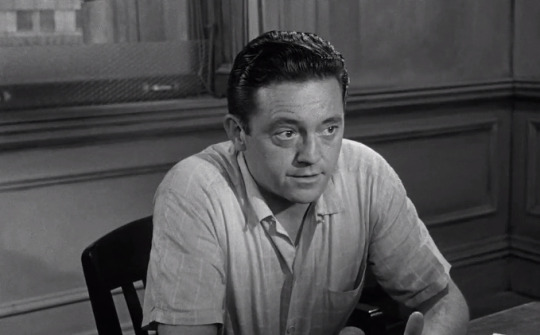
Juror #6 doesn’t have a whole lot of personality, admittedly. He doesn’t have a lot of dialogue, but he is fair minded, willing to change his mind if proven wrong. His chief moment of character is standing up to Juror #3’s interrupting of Juror #9, telling him that he ought to have more respect for his elders. In the end, Juror #6’s character is the switching point, announcing the stalemate, 6 to 6 for a vote.
The balance is changed again by Juror #7 (Jack Warden).
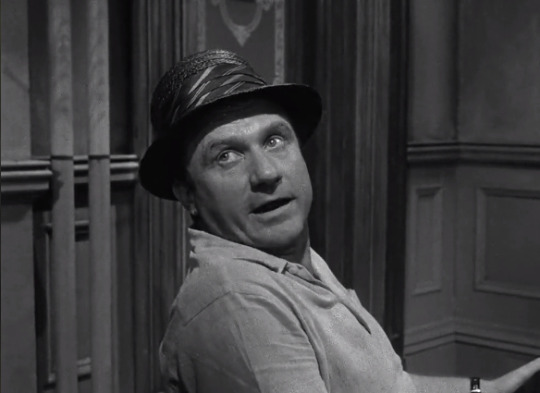
Juror #7 is a self-absorbed person, whose chief concern in the film is the baseball tickets ‘burning a hole’ in his pocket. There’s a game he wants to get to, and his chief concern is voting whichever way that will get him out the fastest. He pretends to be offended when his motives are questioned, but it’s clear that he’s just concerned with leaving. Unfortunately, his is the attitude we can most easily see happening in ourselves with the same task, distracted with Skewed Priorities and too busy being a Deadpan Snarker to put forth the effort our legal system deserves.
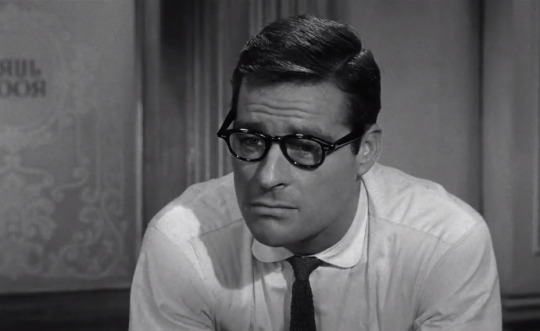
The next vote for Not Guilty goes to Juror #12 (Robert Webber), a Charmer and a Ditherer, almost as easily swayed as Juror #2. He works in an advertising agency, and spends most of the proceedings doodling or playing tic-tac-toe with the other jurors, too busy to pay attention. He approaches jury much like a board meeting, and as a result, his opinions aren’t all that substantial. All the same, he does become the eighth to side with Juror #8, further cementing the majority.
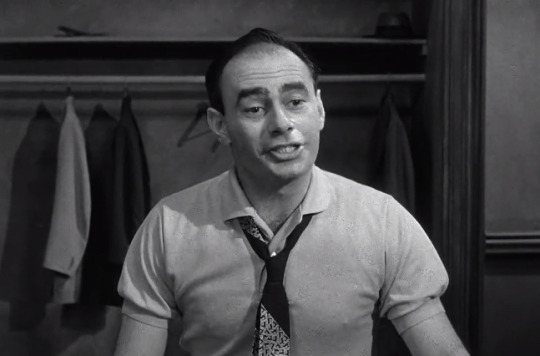
Following him is Juror #1, (Martin Balsam) the Foreman, a reasonable man who just wants this organized. He’s a football coach, a soft-spoken Reasonable Authority Figure who is willing to take charge and keep everyone in order. He’s always trying to reign things in and keep them under control, a vital element to the powder-keg that is the remainder of the jury.
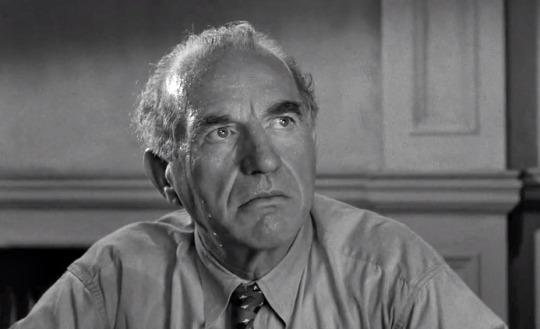
Especially the next vote change: Juror #10 (Ed Begley).
One of the closest things this film has to an antagonist, the constantly coughing, Politically Incorrect Villain Juror #10 doesn’t need any evidence. To him, the boy’s background is enough. He’s a bitter, bigoted, racist Hate Sink, convinced begrudgingly to change his vote after his Villianous Breakdown rant, defeated by the lack of support from his peers.
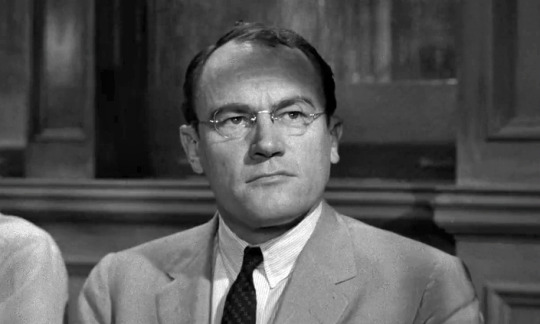
One of the final holdouts, though not a villain, is Juror #4 (E.G. Marshall), another Reasonable Authority Figure and an Implacable Man. He is very logical and reasonable, holding out on changing his vote not out of malice, but of genuine concern for the facts. Wearing a set of Stoic Spectacles (Smart People Wear Glasses, after all), Juror #4 serves as a Hero Antagonist version of The Spock, countering with good arguments and valid questions. In the end, after his own reasons are shaken, Juror #4 graciously admits this and changes his vote, leaving us with the other closest thing this film has to an antagonist: Juror #3.
Juror #3 (Lee J. Cobb) is a bitter Big Bad with a Hair Trigger Temper, the Evil Counterpart to Juror #8. In a case of Believing Your Own Lies, Juror #3 is convinced he is impartial, the chief advocate for the death penalty of the group without realizing he is projecting his bad relationship with his son onto the case. He, too, switches his vote after a Villainous Breakdown, and Paper Destruction of Anger, but it is important to note that this is a Villainy-Free Villain, a Tragic Villain.
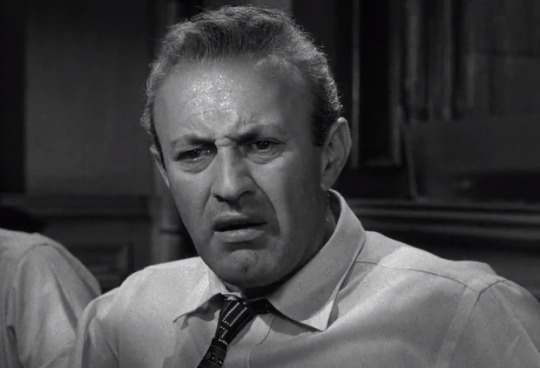
Juror #3 believes his opinion is firmly rooted in the facts, but it becomes very clear as the film progresses that he doesn’t really have as good a leg to stand on as he seems to think. His anger at the defendant is anger at his son, anger at all sons who ‘disrespect’ their fathers. He is unable to get his way in his family, and in the jury, and the result causes his bluster, and his inevitable downfall. In the end, after a Heel Realization, he changes his vote, the final Not Guilty.
As with all the characters, we don’t know if he changed his mind or his ways. For all we know, these men lived the rest of their lives untouched by the events in the jury room on the hottest day of the year, and honestly, that’s not a huge surprise.
These men, while not sharing the same backgrounds as many of us, are meant to be us. We are given a responsibility, a privilege to affect the decisions in our system of justice. We are meant to use it, to take advantage of it, and as a result, we are visible in these men. Whether we’re crusaders for justice, impatient and dismissive, bitter and resentful, or simply taking it for granted, these twelve angry men are us, the audience. It is up to us who we try to emulate, what values we hold dear, and how clearly we view them.
It is the ambiguity and the sheer brutal honesty in which these characters are depicted that this film’s legacy is made. Twelve men without names (aside from two in the epilogue) all too real to be comfortable for American audiences. This is, if not a realistic film, a real film, a mirror held to ourselves and our views on the systems we live with. It’s up to us to decide what we do once we catch a glimpse of the reflection.
Thank you guys so much for reading! Don’t forget that the ask box is always open for questions, suggestions, discussions, or just saying hi. I hope to see you all in the next article.
#Film#Movies#12 Angry Men#12 Angry Men 1957#1957#50s#Drama#Crime#PG#Henry Fonda#Lee J. Cobb#Ed Begley#E.G. Marshall#Jack Warden#Jack Klugman#Joseph Sweeney#George Voskovec#John Fiedler#Robert Webber#Edward Binns#Martin Balsam#Sidney Lumet
9 notes
·
View notes
Text

Dear askrikkaiandhyotei,
Thanks for waiting, first of all. I’m finally finished with all the essay requests that came before yours. As Nahyuta might say...

So, an essay about the Last Rites Prosecutor? Let us begin our journey down the path of enlightenment.
In order to properly talk about this prosecutor monk, I first have to talk briefly about the concept of religion -- not any specific one, but religion as a whole. Throughout history, religion has been described a thousand different ways -- something necessary for life and society, something needless or even harmful for life and society, and just about everything in between. The reason I bring this up is that Nahyuta does a great job of portraying both the positive and negative sides of religion through the use of a fictitious one called Khura’inism -- a pretty bold move on Capcom’s part, but if you ask me, it paid off pretty well.
We first meet him in his natural habitat, as peaceful as anyone could be.

His peace is interrupted when the police drag a captured member of the Defiant Dragons into the temple. As a prosecutor of high reputation, this rebel could be described as Nahyuta’s mortal enemy, but his attitude toward him, while disdainful, is far from unpleasant; he in fact offers him mercy on behalf of the Holy Mother if he’s willing to submit himself to the court’s judgment. Even knowing how empty of a gesture this is, considering the unfairness of every trial in Khura’in since the enactment of the DC Act, it’s still somewhat refreshing to see him speak so calmly to someone considered to be the lowest of the low in Khura’in. His patience stems from his calm nature, but also from his loyalty to the deity he serves, as evidenced in his words:

“O Holy Mother, as your humble servant, you would have me act to save this wretch’s soul? I suppose this, too, is part of my fate.” This demonstrates one of the nobler sides of religion -- a willingness to leave one’s fate in the hands of a higher power.
The next time we see him, he attempts to stop a potentially brutal fight between the police and a fugitive, who happens to be holding a knife to Maya’s neck. His desire for a peace is admirable, especially in such an intense situation, but what he says next is of questionable virtue:
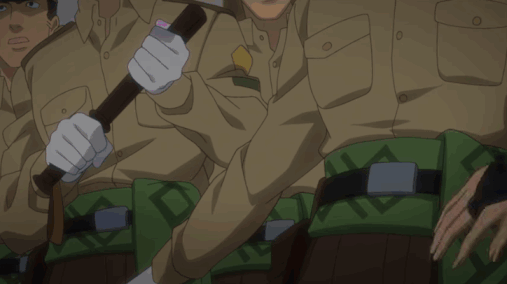
It’s here that Nahyuta displays one of the less noble parts of religion -- looking down on those who don’t share one’s beliefs. Sure, a guy who’s willing to use an innocent bystander as a shield obviously needs some form of help, but what exactly are those condescending words supposed to do for him (or Maya, for that matter)? Not surprisingly, he refuses to listen, but luckily, Nahyuta has reflexes like Little Mac.

Interestingly enough, immediately after this, we see his compassionate side again. He not only rescues a foreign visitor, but wishes the Holy Mother’s divine favor on her.

As uppity as he’s shown himself to be, it’s hard to dislike someone who treats a stranger so well -- especially one who, as we know, has been through some serious rough spots in her life. This introduction of Nahyuta -- a disdainful yet compassionate man of faith -- leads us to wonder if he’s meant to be a protagonist, antagonist, antihero, or something else.
And we haven’t even gotten into the game proper yet. There’s still a lot to unpack about this guy.
Our next bit of info comes from his unlikely detec- sorry, forensic investigator, Ema Skye:

Like a lot of new characters, he’s shrouded in mystery from the very beginning. We at least learn what his reason is for choosing the prosecutor’s path, and where his courtroom nickname came from:
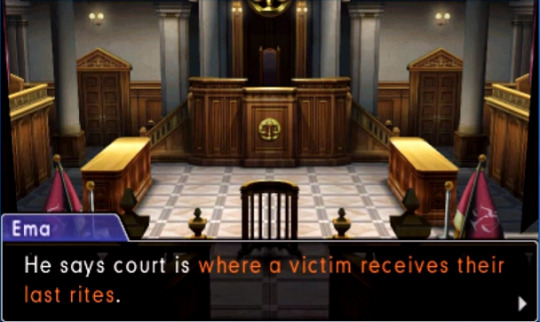
We’ve seen all manner of bizarre prosecutors up until now, but so far, Nahyuta is the only prosecutor who wears his beliefs on his sleeve, especially in the courtroom. For him, prosecuting is about more than seeking justice for the guilty -- it’s about seeking salvation for their victims. In other words, it’s not only his professional duty, but a religious one. Interestingly enough, his professionalism is no less strong than his religion -- according to Ema, he’s known for solving difficult cases around the world.
But religious, professional, or otherwise, Nahyuta proves to be the same as every other prosecutor, as well as every human being -- capable of making mistakes, both big and small. Before we get to that, though...

Well, what do you know? Looks like we have yet another connection between a new character and a current one. Apollo, just how many people do you know that you never talk about?
The importance of their relationship is put to the side as we learn how Nahyuta operates as a prosecutor. At first, he seems like a “gentle-mannered soul,” as Athena puts it, but that visage disappears in the next moment. Like pretty much every prosecutor we’ve seen, he’s proud, demeaning, and flat-out brutal when he wants to be. He even has a favorite adjective for describing his opponents.

Then there’s the sutra he often chants as a fancy way of telling them to “get real.” And as if that wasn’t enough, he uses his “duty as a monk to punish sinners” as a way of claiming the moral high ground, even going so far as to threaten to cast the defense and defendant “into the pit of hell.” It’s hard to blame anyone for getting upset after hearing that, is it?

But hey, at least there’s no physical abuse this time around, right?
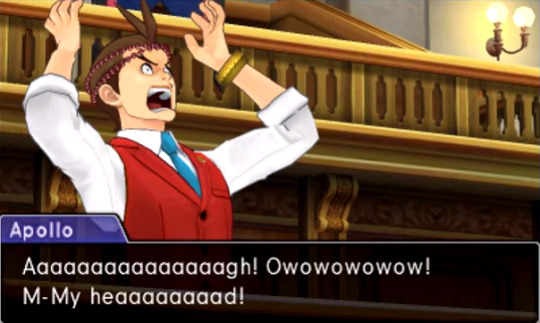
...Oh.
And as fate would have it (or perhaps some divine being who decided to have some fun), his favored forensic detective is a lover of science. Talk about a perfect match, am I right?

At least the clash is more on the hilarious side in this case.
But anyway, on to Nahyuta’s mistakes. Aside from his sickening hypocrisy (which is par the course for most Ace Attorney prosecutors, anyway) and the oversights he makes in court, there’s one blatant sin of his that sticks out: ascribing to a principle that anyone, religious or not, should be able to see problems with -- namely, the DC Act and the persecution of those who defy it. To be fair, his motive for doing so is a humanitarian one -- protecting his family’s honor and safety -- but his willingness to look the other way as his own countrymen are wrongfully imprisoned and executed (not to mention his father having to stay in hiding because of it) is quite the opposite.
This brings us to his signature catchphrase, which could also be called his motto:

There are a lot of situations where this would be good advice, but in Nahyuta’s case, it’s a convenient excuse for him to give up on dealing with the problems of his past and remain loyal to the whims of Ga’ran. More specifically, it’s a mask he uses to hide what he feels inside, which we don’t discover until it’s forced out of him: a lack of faith.
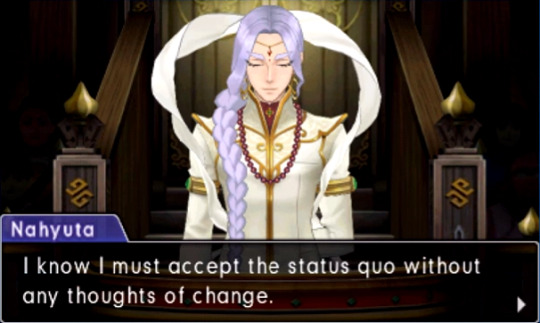
Even as someone as who has no trouble believing in the Holy Mother, Lady Kee’ra, and the Twilight Realm, Nahyuta struggles to believe in change, no matter how much his family, his friends, and his nation need it. And it’s here that we see one of the most beautiful twists in his story -- when it comes to change, his father and surrogate brother have more faith than he does. It takes some persuasion from Apollo to make him realize it, but it turns out he hasn’t quite given up on righting the wrongs of the past.
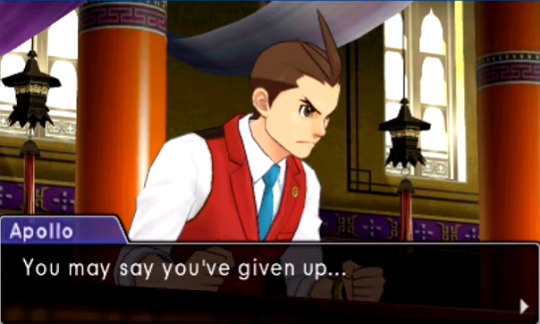
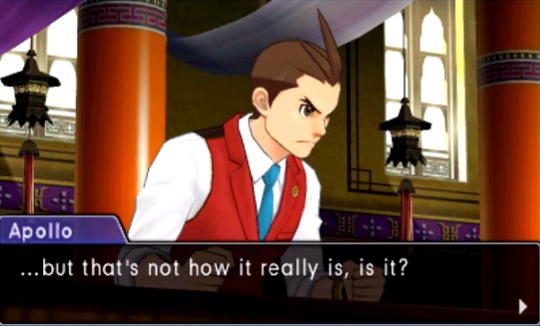
Nahyuta’s unwillingness to confiscate his father’s badge is all the proof Apollo needs that his faith in Dhurke’s fight for freedom hasn’t disappeared completely. After proving this and Dhurke’s innocence, he finally forces Nahyuta to do something few people have the courage to do -- look at his own sins.

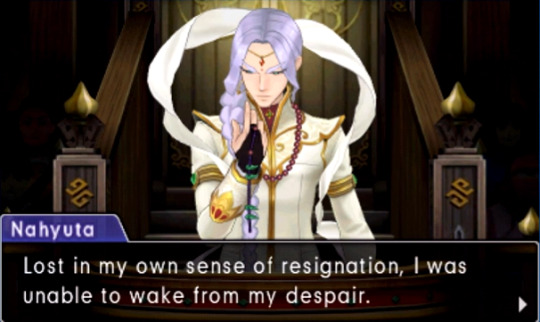
Unlike Claude Frollo, Nahyuta managed to turn his focus inward and realize his own imperfection. It took some push from a close friend for it to happen, but better late than never. And as it turns out, his faith in Dhurke’s creed was as close to him as his right hand all along -- in fact, it was on it.

Much like with Rayfa’s moment of transformation, Capcom was nice enough to give us a voiceover for this pivotal moment.
Nahyuta’s story in SoJ ends with him beginning a journey down his own path of redemption as he attempts to undo the damage caused by Ga’ran and his obedience to her. He’s even bold enough to ask for Apollo’s help in continuing Dhurke’s mission of restoring Khura’in’s legal system.

I love character redemption as much as anyone, but one thing I love even more is when a character takes it a step further by joining the same cause they were once fighting against. Whether it was brought on by the Holy Mother’s will, a love for his family and country, a mixture of the two, or something else, Nahyuta ultimately becomes a changed man. Transformations like this are a sight to behold, especially knowing how much struggle it takes to get there.
So, religion -- is it good overall, evil overall, or somewhere in between? That’s a mystery we probably won’t solve here, but Nahyuta and his religious devotion provide an excellent example of both the good and the evil that can come from it. As both a cliche religious bigot and someone who’s willing to make sacrifices for others, he illustrates the crucial fact that no one is perfect, and that religion doesn’t do much (if anything) to change this, but faith certainly does.
And finally, I have to agree with your analogy of Nahyuta as Apollo’s Edgeworth -- the two of them knew each other from a young age, grew up together, were separated by unfortunate circumstances, and followed very different paths, one being less noble than the other, but eventually undergoing a dramatic change in direction. It makes me wonder what a spin-off game with Nahyuta as the protagonist would look like. It might just be interesting...as long as we don’t have to chant that sutra into a microphone.
-The Co-Mod
46 notes
·
View notes
Text
Myriad Misadventures - Chapter 34
The Myriad Misadventures of a Midgardian Queen-In-Training - Chapter 34
AO3 | Previous | Next
Word Count: 1110
Pairing: Loki/Reader
Rating: T
Myriad Misadventures - Chapter 34
With Sapphire/Ruby gone, life is different. Quieter. Not in a particularly good or bad way, just...different.
You miss her. You miss her so, so much, and if it weren’t for the fact that (based on her letters) she is living a fabulous and very safe new life back home, reunited with her sister and no longer harassed by her bigoted parents, you’d be begging her in writing to come back. Hell, if you could leave the palace, you would go to her door and beg her in person. Irina, Rhea, and Rosa are nice (well, Rosa is slightly less antagonistic than before, you suppose), but none of them have quite the same joie de vivre.
Adding to the list of things perpetually on your mind is this: half the girls are gone now. Which means that half of the girls are left, and the fact remains that you are one of them. It fills you with pride as much as it confuses you. And boy, does it confuse you. You at least expect the pace to pick up though, now that you’re down to the last four.
But just like that...it’s as though time comes to a stop, because nothing happens. For months.
To be clear, you’re still expected to attend classes and dinner, and go to whatever ridiculous themed ball Lady Amara can cook up next. You write and play music and talk with the other girls in your free time, you talk with Loki, you ride horses and go on picnics and read through a solid portion of the library. Your birthday comes and goes, with - to your relief - no real pomp and circumstance to celebrate it. You can name all of the world’s countries in alphabetical order on command, you know how to settle various political disputes at the drop of a hat, and you’re as well-educated in matters of etiquette as any teenager could possibly be.
But that’s it. Nobody else is dismissed from the palace, including you. It’s been just about a year since five became four, and, as far as you can tell, none of the other girls have made any more romantic progress with His-Royal-Slowness than you have (though they probably have, considering you’ve only gotten as far as admitting to yourself that you wouldn’t mind being his friend).
Which leaves you...where?
***********************************************
Dear Mom, Dad, Carlie, and Erik,
I miss you.
You sigh, and cross it out. It’s the holidays, dumbass. Maybe start out on a slightly happier note, yeah?
Now, let’s try again.
Happy holidays! Thank you for the card - it was funny to be on the receiving end! Carlie, remember how much we’d complain about having to smile until Mom said we’d gotten the perfect picture? Remember how much our cheeks hurt? I know it sounds crazy, but I miss that now, too! I’m having fun here, but I wish I could see you guys this winter.
“What are you writing?”
You flinch - out of surprise, not fear - and bend your head back to look at the black-and-green-clad dork standing behind your seat on the couch. “It’s a letter, to my family. I got a Christmas card from them a few days ago, and I figured I might as well say thanks,” you explain. He walks around and settles into a nearby chair, and you cock your head at him. “You haven’t been around much the last few days. Everything ok?”
“What’s a Christmas card?”
Way to deliberately avoid my question… He looks too exhausted for you to call him out on it, though, so you play along. “Here.” You pull out the rectangle of paper, glossy on one side, with a picture of your parents and siblings grinning in front of the house. You can tell by the shovel propped against the stoop that they had just finished shoveling snow out of the sidewalk, and from the slightly-too-big smiles that Mom had probably forced them to get the picture before she’d let them go inside. “It’s a holiday tradition. Lots of Earth families do them. They don’t have to be for Christmas, either. It’s an easy way to let people know you’re thinking about them, in case you don’t get to see them during the holidays. They sent me one last year, too.” You feel your smile fade slightly as you give the picture another once-over. Carlie’s shooting up like a weed, her previously gap-toothed smile beginning to fill in. She’s almost ten, now, you realize. Erik is looking more like Dad every day, you’re sure, and your parents seem a little...wilted. Less genuinely happy than you remember them.
“You miss them.” It’s not a question. Even the guy who claimed Earth as his new kingdom is observant enough to realize that taking a young woman away from her family for two years isn’t the kindest thing to do.
“Yeah.” You shrug, tucking the card back under your journal. “My baby sister’s getting older. It’s weird, not being there to see it. And it’s even weirder that I’m almost a legal adult, and I haven’t seen any of them in person since I was sixteen.”
When you look back up at him, he’s staring at you with...remorse, you think. “I’m very sorry.”
“Not enough to let me go,” you joke. Or, it’s meant to come out as a joke, but had more of a sting than you’d anticipated. “Sorry, I mean - ”
“No need to apologize. Being separated from your family is difficult.” He goes quiet for a moment. “I imagine the other ladies feel the same way.”
“Probably.”
“You asked me last year if I would release you, and I said no.”
“Loki - ”
“Don’t. Please.” He presses a hand to his mouth, shakes his head, and speaks again. “You are free to leave whenever you wish.”
What?
You hear a soft scattering of papers as the writing materials slide off your lap. He’s down on the ground before you have a chance to even move, gathering the papers together and straightening them out again. “You would do that for me?”
He places the small stack of papers on the couch next to you, and, still kneeling, grabs your hands gently. “(Y/N), you gave me your friendship and I repaid you by keeping you trapped here.”
“I’m not trapped - I mean, I want to see my family, I just...”
The kneeling has you more flustered than usual, and you can’t quite figure out why. But you take a deep breath, look him in the eyes, and finally, finally find the words to ask him what you’re really thinking:
“Do you want me to leave?”
#loki#loki/reader#loki fanfic#loki x reader#loki fanfiction#fanfic#fanfiction#loki laufeyson#reader insert#reader-insert#y/n#doeeyeddarling#myriad misadventures#fish fork
1 note
·
View note
Text
Until Dawn review
I’ve recently finished my full playthrough of Until Dawn and after going through the main story of the game multiple times and experimenting, I’ve compiled my thoughts! This action-visual novel was extremely interesting to play.
Firstly, the game is marvellous in terms of atmosphere. The sound design, acting and music all create a very strong mental image of the cold environment and the intensity of the action sequences. This game has hit the nail on the head in terms of tone and setting. The environments are crafted wonderfully, and a lot of the gameplay segments feel relatively realistic. When a character pulls off a feat, it’s never unfeasible or totally impossible in real life. When a character is hurt or feels the cold, they react in a pretty normal way. The choice of a ski lodge during winter as a setting really enhances the tension of the story, and even with occasional slivers of dark humour the tone is very much under control. I never felt like my immersion was broken because the game became “too ridiculous” and this can happen with action-VN games. From the moment the opening theme started and that intense and overpowering “Oh Death” started playing, I was hooked. It was amazingly put together.
The decision to use the wendigo as the antagonistic species was a bold move. It’s not often that we see the wendigo adapted to games or films, and I think the decision to use them instead of werewolves or some other cryptid was extremely creative. I already have an interest in wendigo from playing RPGs and reading myths about them, so seeing them in media always makes me happy. The wendigo were also animated in an extremely masterful way. They’re absolutely terrifying. The gory deaths they cause are extremely creative and intense, and they pose a very real threat. One wrong move and the wendigo can easily be the end of you. Those that know me through this blog are aware of my penchant for creative and unique gore, so naturally this made the game very captivating.
Onto the game design, I thought that even though there were a lot of playable characters it was handled quite well. No matter who I was playing as I never felt like I switched control too quickly, or like it was jarring. Each segment was introduced with care and getting into each character felt organic. I do wish that the game was not divided into arbitrary chapters, though. The reason I say this is that whenever I wanted to collect an item I’d missed I had to replay an entire section of the game right from the beginning. Other Action-VNs and even regular VNs either allow you to skip segments of dialogue you’ve already been through or to jump into different sections of a chapter to get to specific points more quickly. Having to play through an entire chapter again just to get a totem that is right at the end of the chapter is very tedious. This did make the game frustrating at times, as the gameplay is so unforgiving and precise that it’s very easy to make mistakes and miss the item you’re looking for. That means starting the whole chapter again and again.
The game is difficult, and I like that about it. It doesn’t hold your hand and doesn’t give you arbitrary button presses all the time. The quick-time inputs feel natural because the button that you will have to use often corresponds to a direction. (for example, if you’re climbing then triangle will be used while launching yourself upward whilst X and square will be used to control your legs) Sometimes, the best thing to do is also nothing - not acting on a quick time event can save your life, if the action is too dangerous. This was also very well-implemented.
My absolute favourite game mechanic is the “stay still” mechanic. Wendigo can not see you if you stand still, so the game requires you to hold your controller very still to avoid detection. Not only is this a very unique way to use motion controls, but it’s also very well-tied into the lore. This is an example of an innovation that pleasantly surprised me. The tension it creates is unparalleled by any other horror game mechanic I’ve seen. The first time I encountered it while facing a wendigo, my heart raced. I genuinely felt fully immersed in the fear of the situation. This was an amazing choice that ultimately made the game for me.
I also loved how the game adapted to me as a player. During the “therapy” segments of the game, while you’re being psychoanalysed by Dr. Hill, the decisions you make influence the game you’re playing. The fears that you express towards Dr. Hill will impact the scares used in the game. This is really interesting and I was really pleasantly surprised by it as well. Games that adapt to your psychology are far and few between, but I think analysing the fears you have and changing the content accordingly makes for a really unique experience for each player. I loved this personal touch.
The characters in this game are fantastic. They’re all very balanced and unique. Not one of them is an all-round likeable person. They all feel like very real young adults with flaws and their own motivations. The way they react to certain interactions is very natural and organic, and I’m really impressed by how well they are characterised and developed. Throughout the story their emotions and experiences feel very relatable and human. Their personalities are all so unique and fun that I found myself quickly latching onto certain characters such as Chris, Josh and Jessica. I really cared about what happened to them, and the way they were written influenced the way I played quite a lot.
My feelings about the dialogue are complicated. On one hand, I love that it was written as a homage to corny 80s horror films. That was a great touch. However, some lines felt off. Sometimes characters would say things that didn’t feel natural. For example, I don’t think it would be typical for an 18-year-old boy to call his girlfriend “hon”. I also didn’t like Mike’s little “oh hell yeah” catchphrase whenever something suggestive happened. Talk about cringeworthy. The dialogue corresponded quite nicely to the characters’ personalities and was believable for American suburban teenagers, but there were points where it felt a bit jarring. Another thing that stood out to me as irritating is that Mike makes a pretty tasteless homophobic joke at one point and it’s not addressed as bigoted - the other characters just kind of let it happen. It’s only one short moment, but I hated it. Whilst the dialogue is quite flawed and I can see a lot of players finding its corniness annoying, it had its charms.
The acting in this game is phenomenal, and it’s clear that the actors had a great time working on it. Everybody on the cast of this game loved being in it, and believed in the project’s creative vision. The facial and physical acting is extremely well-performed. The voice acting is spot on, and they portray their young and naive characters very well. Rami Malek did an especially good job at portraying Joshua Washington, as the role had a lot of emotional range to it and I can only imagine how much work he put into that performance. I also want to mention Peter Stormare’s portrayal of Dr. Hill, which was mindblowingly intense and extremely intimidating. He is a phenomenal actor and the way he pulled off the character’s mystery and powerful aura was amazing.
Overall, while there are times that the game feels corny or unappealing in its dialogue or slightly tedious to replay, it’s very worth playing for those that enjoy horror and/or action-VNs. The very first playthrough is always an intense experience. Even my partner, who normally hates action-VNs enjoyed it purely because the horror was that effective. This game was a really unique experience, and one of the better action-VNs I’ve played. If you haven’t played it and you’re interested in experiencing a creative and wild horror plot with very interesting execution, go ahead! I highly recommend it.
#until dawn#game review#review#brenniviews#I love this game!!!!#visual novels#action visual novels#video games#gaming blog
5 notes
·
View notes
Text
NOPE BOOK TAG!
Tag creator (A BookTube Book) - https://www.youtube.com/channel/UCQt_…
1. NOPE Ending: A book ending that made you go NOPE either in denial, rage or simply because the ending was crappy.
This is a tough one. I rarely hate how literature ends. I’ll name a few comics and then move on the literature.
Novels:
The Man who fell to Earth by Walter Tevis (Love this novel but hate the ending.)
The Dresden Files: Changes
The Frankenstein Papers by Fred Saberhagen (He writes Dracula so well but his Frankenstein Monster... Spoilers, he’s a f--king alien with amnesia. That’s the twist. He just THOUGHT he was created by Victor Frankenstein. It’s so... Stupid.
The Last vampire by Whitley Strieber.
Lilith’s Dream by Whitley Strieber
On my Honor
Lolita. WHY is this a classic?!?
______________________________
Comics:
The Sandman: The Kindly Ones. I know it’s a classic but out of all of the original Sandman this is the one I liked the least, loved the rest.
The Dreaming (1990s to early 2000s version). It’s just... awful.
Madman & Monster (written by Steve Niles and published by IDW). I hate the ending but like the premise.
Nineteen eighty-four by George Orwell. Great novel, just very depressing.
Manga:
Return to Labyrinth. The author (Jake T. Forbes) just wanted his cake and eat it too. He establishes that Jareth is Sarah’s true love but at the same time decides that they can’t be together “For reasons” and has Toby give a “I learned something today” speech that lasts several pages to justify it. No, if it’s true love, they’re supposed to be together. Don’t try to placate both the shippers and the fans who want them to not be a couple, you won’t appease anyone if you try to appease both.
Wolf’s Rain:
It’s just so sad. Why!??
_______________________
2. NOPE Protagonist: The main character you dislike and drives you crazy.
Novels:
Miriam from The Hunger, The Last Vampire, and Lilith’s Dream by Whitley Strieber.
The Vampire Armand from Anne Rice’s The Vampire Chronicles. He’s too much of a Sadist. I don’t understand the appeal.
Lolita. WHY is this a classic?!
Comics:
Echo from The Dreaming (Late 90s / early 2000s version)
Riri Williams, the current writing of the Captain Marvel comics, actually pretty much all of Marvel at the moment...
_______________________________________________
3. NOPE Series: A series that turned out to be one huge pile of NOPE after you’ve invested all of that time and energy on it, or a series you gave up on because it wasn’t worth it anymore.
Novels:
The Hunger book series by Whitley Strieber
Anne Rice’s The Vampire Chronicles, most everything after Tale of The Body Thief and Tale of the Body Thief wasn’t that good...
The Dresden Files. I don’t know, my interest just kind of waned and also I came across a few unpleasant fans who legitimately believe women and men “talk differently” and “use different language” when speaking and told me a woman can’t write male characters and visa versa. Mary Shelley begs to differ!
Comics:
The current Sandman Universe comics...
Morbius: The Living Vampire (1990s run)
Manga:
Return to Labyrinth. The author (Jake T. Forbes) just wanted his cake and eat it too. He establishes that Jareth is Sarah’s true love but at the same time decides that they can’t be together “For reasons” and has Toby give a “I learned something today” speech that lasts several pages to justify it. No, if it’s true love, they’re supposed to be together. Don’t try to placate both the shippers and the fans who want them to not be a couple, you won’t appease anyone if you try to appease both.
_________________________________
4. NOPE Popular pairing: A ship you don’t support.
I don’t really hate many pairings...
Oh, wait. Lolita. Do I really need to explain?
Comics:
Joker and Harley Quinn (original versions as created for Batman The Animated series.)
Cain and Abel and their sister-wives in The Dreaming (late 90s to early 2000s comics). That was just... Oh, my God. Was that just to be edgy!? For God’s sake, Abel’s fraternal twin sister was Cain’s wife and locked in attic!? WTF?!?
Lucien and Nuala (also in The Dreaming late 90s and early 2000s version). Essentially “Hey, the people we’re in love with are dead. Why don’t we hook up?” “Okay! You’re good enough. Let’s settle on each other.”
Does Caitlin R. Kiernan have any concept of love, at all?
Steve and Bucky. Not because it’s a bad ship or because it’s gay but because the fans who support it are so rabid and if you suggest it’s not canon they immediately assume you’re a homophobe and send you hate.
SwanQueen (Emma Swan and The Evil Queen in Once Upon a Time) similar reasons as above.
____________________________
5. NOPE. Plot twist: A plot twist you didn’t see coming or didn’t like.
The Frankenstein Papers by Fred Saberhagen.
(He writes Dracula so well but his Frankenstein Monster... Spoilers, he’s a f--king alien with amnesia. That’s the twist. He just THOUGHT he was created by Victor Frankenstein. It’s so... Stupid.
_______________________________
6. NOPE. Protagonist action/decision: A character decision that made you shake your head NOPE.
Faust and his hornness for FOURTEEN-YEAR-OLD Gretchen and almost everything he did because of that horniness.
7. NOPE. Genre: A genre you will never read.
I don’t think there’s a genre I’d never read. But I’m not a big fan of young adult romances or bodice rippers and torture porn. I’m not into errotica or graphic violence even though I adore Gothic Horror.
8. Nope format:
Umm.... I prefer hardcover to paperback but I don’t avoid any particular format. I do hate when the new Barnes and Nobel classics call things like Edgar Allan Poe and H. P. Lovecraft, Mary Shelley, and Bram Stoker “Gothic fantasy” written across the cover. It perpetuates the idea that horror is lowbrow and it angers me that we refuse to consider good quality horror to be horror anymore.
Anne Rice’s Prince Lestat (when I read it with wet hands and the dust jacket off) the color on the cover started to turn my fingers dark blue. I never want that to happen again.
9. NOPE. Trope: A trope that makes you go NOPE.
Long lost child that the protagonist didn’t know they had because the mother (or in rare cases someone else) thought it would be best the child never know they are related to the protagonist because their life is too dangerous / cursed / ect... I hate when parental rights are stomped on for plot, and especially when “it’s okay because it’s the mother who did it and the mother just wants whats best for the child.”
10. NOPE. Recommendation: A book recommendation that is constantly hyped and pushed at you that you simply refuse to read.
I’ve never refused to read a recommendation but I have later thought “Why did you think I’d like this?!”
Twilight “Because you love vampires.”
Oh, and Frankenstein’s Monster: A Novel by Susan Heyboer O’keefe. Just because he looks like the version from the Shelley novel doesn’t mean he acted like it. That as awful.
______________________________
11. NOPE. Cliche/pet peeve: A cliche or writing pet peeve that always makes you roll your eyes.
Wasn’t this already number 9? I thought we covered this with tropes. Many tropes are cliches. Oh, well...
Long lost child that the protagonist didn’t know they had because the mother (or in rare cases someone else) thought it would be best the child never know they are related to the protagonist because their life is too dangerous / cursed / ect... I hate when parental rights are stomped on for plot, and especially when “it’s okay because it’s the mother who did it and the mother just wants whats best for the child.” (Cough) Susan in The Dresden Files. (Cough.)
Oh, and “He’s blue collar so we’re going to use him as the serrogate racist / bigot now even though he wasn’t before.” (Cough) Merv Pumpkinhead in the new version of The Dreaming. (Cough.)
12. NOPE. Love interest:
I thought we established this with the ship conversation?
I don’t feel like re-writing it, just re-read that one. Same answers apply.
I guess I can add The Corinthian from Neil Gaiman’s The Sandman. You know if it ever gets a film or TV series adaptation someone somewhere will find him attractive and start making errotic art and fan fiction about him...
13. NOPE. Book: A book that shouldn’t have existed that made you say NOPE.
The Dreaming Late 90s early 2000s version.
I don’t really like saying any book shouldn’t exist. But there are some that are really awful sequels or insults to an established lore because of how subpar they are.
___________________________________
14. NOPE. Villain: A scary villain/antagonist you would hate to cross and would make you run in the opposite direction.
The Corinthian from Neil Gaiman’s The Sandman and pretty much any antagonist created by George R. R. Martin.
15. NOPE. Death: A character death that still haunts you.
Morpheus in Neil Gaiman’s The Sandman.
And even Abel’s death even though he comes back later.
___________________________
16. NOPE. Author: An author you had a bad experience reading and have decided to quit.
Anne Rice. She doesn’t even remotely write the way she used to . It feels vapid now. And i have trouble reconciling myself that the angry bird aliens from Brevena and the Replimoids exist in the same universe as Interview with the Vampire.
Also she’s been very cruel and unprofessional in her behavior to those who have criticized her work and “I didn’t know I was sicking people on anyone” shared negative reviews with direct links to pages on her Facebook over the years. it got nasty. She even dug up one of my old reviews for Blood Canticle that I wrote FIFTEEN years ago!
And to a lesser extent, J. K. Rowling. Her views of Americans and especially “Nomaj” (linguistically) just makes me cringe internally. Americans are the more old fashioned with language, not hipster (i.e Elevator vs. Lift, Cellular phone vs. Mobile). Not to mention cloistered religious-style orders (like Catholicism) use the same terms from country to country. This is also true with Wicca. Linguistically the American terms in Fantastic Beasts do NOT make sense.
@sorry-for-the-chocolate @thesaramonster @zal001 @missghostlymoonshadow @kaimaciel @endlessemptynight @deathlyendless @vagaryhexxx @thegreatvampirekiller @unnecessaryhorns @sweatyeddieandaliengoo
6 notes
·
View notes
Text
1 x 1 : Where No Man Has Gone Before {Subtext Study}
As we’re going in production order (which seems to produce a more linear story) the story of Gary Mitchell and his tinfoil eyes is where we’ll begin this journey into Star Trek subtext. There’s quite a bit in this episode to wade through, particularly of the homoromantic quality, so let’s get started.
Tellingly, perhaps, our episode opens on our two main objects of study playing their beloved three-dimensional chess. As someone who has been in Spirk fandom for awhile now, I can attest that 3D chess is mentioned as an activity Kirk and Spock engage in together in their recreation hours in about 99.9% of fanfics (logically, the chances of them having recreation hours that overlap with one another is about slim to none, given their respective positions, but a little willing suspension of disbelief never hurt anyone). However, I think we only see them actually play it in-canon in about 2-3 episodes total, if that.
Still, there’s something significant about the choice of chess as a game for these two to engage in and this particular game’s history as a means of courtship and flirtation.
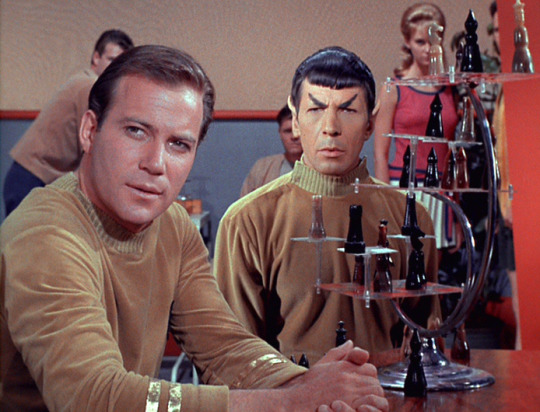
This is also our first indication that Spock adheres strongly to the fact that he’s Vulcan and “without” emotions and that Kirk delights in teasing him about the fact. “Certain you don’t know what irritation is?” Kirk asks, knowingly, with a shit-eating grin after he makes a move that Spock wasn’t anticipating (having already smugly announced he would have Kirk check-mated in his next move). The banter here relies heavily on the natural affection between the two of them, that which the script wants the audience to be aware of. Though Spock alleges to be immune to emotions he is clearly anything but, and yet, Kirk finds an affectionate delight in this fact. He’s allowed to rib Spock a little bit about this without threat of any real offense, indicating a very high level of trust between them.
Certainly this could be the banter of two who are just friends and have no unspoken attraction or romantic interest between them, but talk like this often manifests as flirtation as well. Kirk’s decidedly sultry smirks at Spock (the first of thousands that would proceed them in the next few decades of material) and his huskier tone of voice are interesting acting choices for Shatner to have made if he hadn’t intended to play Kirk as flirty in this scene.
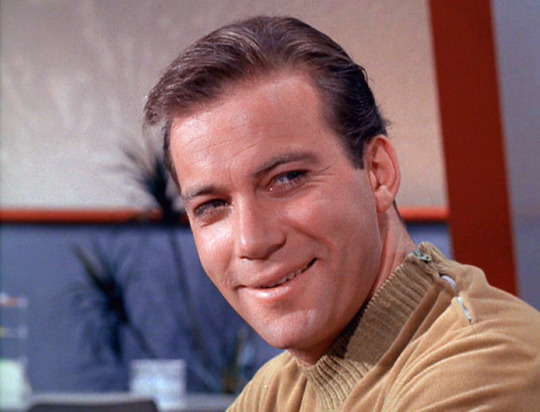
As I will often disclaim, I’m not suggesting that the original intent was the same as the interpretation I’m asserting here. What I am saying is that the evidence for a layer of flirtation is there, be it intentional or not, and to not at least acknowledge it is to ignore the obvious.
Moving on!
Kirk has been attempting to stay alert for any news about a recently heard Earth distress signal (despite the -ahem- distractions). News of said distress signal finally comes in, interrupting this little verbal tango between our boys, and Kirk and Spock rush to the transporter room to find an old-style ship recorder. Spock asserts that due to the damage on the object it’s likely that something happened to the ship (in the vein of blowing up or whatever I guess). The recorder begins transmitting a signal as soon as Scotty starts feeding tapes into the computer and Kirk puts the ship on red alert.
Enter Gary Mitchell, barely missing the turbolift ride alongside our boys. It’s made obvious right away that Gary and Jim are close from the casual way they greet and chat about ship stuff even under red alert. Gary then turns his attentions to Spock and, weirdly, sort of sizes him up before asking in a more straightforward tone “So, you finished the game?”. Spock nods and moves forward to the doors preemptively while explaining, “[Kirk] played most illogically. His next move should’ve been the rook.” Behind Spock’s back, Kirk grins and makes a throat-cutting motion to Gary to subtly indicate Spock’s obvious loss.
When I first saw this episode, and each time I return to it after a prolonged absence, I always initially get a sort of antagonistic vibe between Spock and Gary. On my original watch I thought it was going to be some sort of bigotry thing on Gary’s behalf against Spock’s being a Vulcan (which does happen with a different character in a different episode) but that ends up not being the case here. We really have no reason to believe there’s anything antagonistic between them, at least nothing that’s addressed directly.

(note Kirk’s got another amused, if not sultry look for Spock here)
The likelihood is that Spock’s cold retreat to the turbolift doors is more attempt to escape mention of his chess defeat than anything else. Gary’s once over of him, however, and hard tone of voice might suggest something else. Could be an organic jealousy in the fact that they share a mutual, close friend and seem to be on equal levels of bonding with the same person, but don’t seem to have much in common with one another and occupy awkward spaces beside him, sort of privately elbowing one another for the same category in Jim Kirk’s life. But what is that category, exactly? Is it just one of platonic friendship or something else?
A common argument against Kirk/Spock is the assertion that Jim (specifically) is clearly a lover of women and has never taken a male lover in canon and so must be, therefore, purely heterosexual and uninterested in men. This is a bit of fallacy in an of itself because 1) of course we never saw Kirk take a male lover in any sort of obvious way, this was a show produced in the 60′s for godssake, 2) Kirk’s frequent and, presumably exclusive, taking of female lovers doesn’t necessarily exclude him from being able to find men attractive and enjoy romantic/physical relationships with them, 3) most of the time when Kirk would take a female lover it was to gain something for the purpose of a mission; only rarely was he actually indulging in sincere feeling or attraction.
All that said, there is an argument that Gary Mitchell might be the earliest precedent and indication that Kirk has taken at least one male lover before and, therefore, has a history of finding men physically and romantically attractive. Due to the attitudes of the time it’s purely speculation based on subtext and ambiguity, but one I’ll explore here as we learn more about Gary and Jim and their history together.
In any case, I will also add that sexuality is fluid and being attracted exclusively to one gender for most of one’s life doesn’t mean that one may never find themselves drawn to something different at some point. Even if Kirk had never taken a male lover, had never found men attractive in any way prior to Spock, it doesn’t mean that Spock couldn’t have been an exception. I would also assume at this point in earth’s social development that relationships of all kinds between consenting adults are accepted with much more open minds, that any bigotry that might keep someone from indulging in or owning up to a desire would no longer exist. Food for thought. Back to our regular programming.
The three men go to the bridge and take their respective places. Kirk orders neutral warp at the edge of the galaxy and puts out a ship-wide message that the disaster recorder came from the SS Valiant two hundred years ago, the hope being that more insight will eventually be granted to them as to what happened to said ship. Meanwhile, Spock continues to have no luck with the burnt out tapes.
The department heads arrive on the bridge as ordered and we meet Dr. Elizabeth Dehner, a psychiatrist that recently joined the crew. Sidenote: if the Enterprise was ever granted a psychiatrist to replace her after this episode (spoiler alert) they certainly aren’t part of the ‘department heads’ club as we never meet them- maybe due to the events of this episode, who knows, but I can at least hope the Enterprise continued to value the mental health of her crew members despite all that. I digress.
Spock announces that the recorder has finally begun to transmit something and Kirk steps up behind him at the science station because it’s absolutely 100% necessary to the mission. Completely. Because it’s not as if Kirk would probably have been able to hear him fine from his chair or anything.
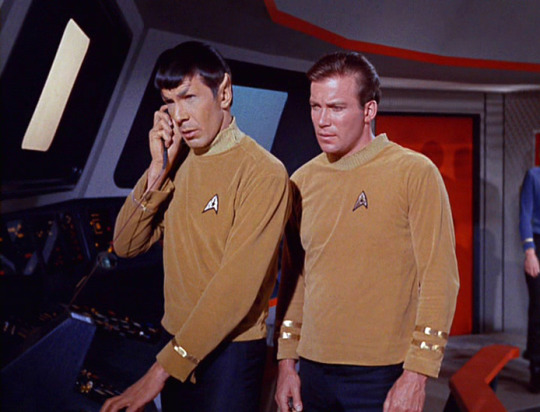
(okay, this one is just me being a bit silly but STILL, really now, Jim)
Dr. Dehner expresses an interest in knowing how the crew of SS Valiant might have fared psychologically under the distress. Gary Mitchell expresses his respect of his female crewmen and women in senior positions of power by openly flirting with her in front of the crew and then, just as openly in front of the Captain, calling her a “walking freezer unit” when she doesn’t reciprocate. He even makes ‘ooo ice queen’ face at Kirk after she rebuffs him. Nowadays that would probably, hopefully, rightfully so be grounds for sexual harassment and something Kirk would’ve had a responsibility to shut down right then and there, but y’know. 60′s. Women in power are scary so we have to knock them down a peg.
Weird how Star Trek is meant to take place in a more open-minded, less bigoted, socially progressive time in our future, but is still sometimes a product of the generation it was produced in. I love it regardless, of course.
Anyway, Spock begins to relay the spotty transmitted information; apparently the Valiant encountered a magnetic storm and then, for reasons that are unclear, began frantically searching for information on ESP in humans. Kirk asks Dr. Dehner about this and she helpfully explains that some humans can indeed see future events, but that the ability is never very strong. Spock continues that one crewman seemed to have recovered and that was when the frantic search for ESP info began, followed by an apparent self-destruct order from the Captain. Unnerved by this, Kirk orders that they leave the galaxy at warp factor 1.
Unfortunately, a magnetic force field appears right about then and the two women on the bridge grab the hands of the men nearest to them because, obviously, right? 60′s. Gary and Dr. Dehner are struck by the magnetic surges while the rest of the bridges’ control panels get various levels of fucked up. Even still, the Enterprise makes it through the storm and Kirk orders Spock to collect damage reports (with a very necessary and much needed hand on his shoulder, naturally). He then checks on Dr. Dehner (who appears to be fine) and then Gary, whose head he lovingly cradles in his hands.

(This tender moment only goes on to show us that Gary has spooky tinfoil eyes now!!! Can’t even imagine how painful those archaic contacts must have been for the actor.)
Upon return from commercial break, Kirk informs the audience that the Enterprise’s main engines and warp drive have been fucked beyond use. He also has Spock checking out Gary and Dr. Dehner’s records for ESP ratings, only to see that they have some of the highest on the ship (these must be old records though because there’s no way those two are 23 and 21 years old, respectively, at the time of this episode- SORRY, BUT TRUE), concluding that this must be why they were shocked and lived to talk about it. Dr. Dehner returns with autopsy results on the deceased, informing that their brains were burned out with the electric shock. She also vehemently defends ESP ability against Kirk and Spock who are suspicious of whether or not ‘espers’ are dangerous.
Kirk then goes to check on Gary who’s been under medical observation and we’re granted a deeper insight into their friendship.
Gary somehow knows it’s Kirk before he sees him or allows him to say anything. He points out that Jim looks worried and Jim replies with a knowing smile, “I’ve been worried about you ever since that night on Deneb IV.” Gary laughs and looks down coquettishly. “Yeah, she was nova, that one.” The fact that we have no idea what they’re talking about and that this conversation barely makes any sense of is no real importance. We’re not supposed to understand. This is meant to feel like listening to two friends who’ve known each other so long and so well they’re almost speaking a shared, exclusive language about experiences and jokes only they understand. Gary talks some about his weird eyes and then he goes back to teasing Kirk. Apparently our strapping Captain was something of a bookworm nerd back in his academy days, who knew?? (His bookishness happens to be one of my favorite aspects of Kirk’s character and one that history so often forgets in favor of him being some kind of machoman womanizer- ugh) To this teasing Kirk responds with a blush that would rival that of a school girl with a crush on her teacher.

(tee hee OH GARY STOP IT)
Gary mentions how he “aimed that little blonde lab technician” at Kirk probably to distract him from being too tough in his student-teaching position, to which the latter responds with, “You what??!” “Yep. I outlined her whole campaign for her.” “I almost married her!” So, we know Kirk likes the intelligent types as much as he is one himself. Fascinating. (Sidenote: I personally headcanon that the “little blonde lab technician” was Ruth that Kirk ‘sees’ in Shore Leave, but that’s for another episode discussion) Gary warns Kirk to be good to him because he’s “getting even better ideas” now. He also has a forebodingly echo-y voice now to indicate to a wary Kirk that shit’s about to get real.
So, what’s the deal with Jim and Gary? Everything is played rather ambiguously between them, certainly in no small part to indicate to us, the audience, that they’re close and have been for years. To have them discuss blatantly spelled out exposition of their shared past would feel in-organic and I’m glad the Star Trek writers chose ambiguity for this reason. But this ambiguity, plus the sultry way Gary teases Kirk and the affectionate, bashful blushes and smiles he gets in return could easily indicate that their friendship may not be platonic (or perhaps it is now, but hasn’t always been- maybe there was some sexual exploration together at the academy and feelings due to this that Kirk never really shook). There’s subtext enough here to believe so, I think. I’ll leave it to the reader to decide whether or not Gary could qualify as one of the earliest indications that Jim may not be so immune to masculine charms as history would so direly like for us to believe.
Anyway, Kirk returns to the bridge to find Spock watching Gary’s superhuman reading speed that is ever increasing. Spock pointedly asks the rhetorical question, “Is that Gary Mitchell? The one you used to know?”. A rather...knowing question for a being that claims to not understand or experience emotions. Kirk orders a 24 hour watch on Sickbay and all the examinations and tests possible. Gary then looks over at the viewing screen, right at Kirk, as if to suggest he knows he’s being watched.
Back in Sickbay proper Dr. Dehner has arrived to...probably do an examination or something but she’s not coming off as 100% professional. Since she’s being a little bit more receptive now Gary reluctantly apologizes for having called her a “walking freezer unit” and she assures him that “women professionals do tend to overcompensate”. Once again, this has been obligatory misogyny thanks to the 60′s!!! This little song and dance continues between them as Gary changes the readings on his vitals panel and pretends to be dead (just to get Dr. Dehner close to him- smooth, buddy) and recites a love sonnet at random from memory (that was actually written by Roddenberry himself when he was an aviator- the more you know!).
It’s funny how het flirtation in this show is only different for being more blatant in dialogue and sometimes physicality. The acting choices, reactions, tone of voice, expressions, etc, are pretty much the same when the subtext suggests it’s two men flirting. Just saying.
Lt. Kelso comes in to check on Gary and Gary informs him exactly what’s wrong with the engine. Have you gathered yet that this guy has special powers now? Gee, I hope so, because it’s not as if the show has been making that abundantly clear.
The Department Heads once again meet in the...meeting room, I suppose, Lt. Kelso showing via a blown circuit that Gary was right somehow. Dr. Dehner is late because she’s apparently in love with Gary now to the point of throwing all sense of professionalism out the window; when Spock points out Gary is transforming into something unnatural, Dehner chides him for not showing more compassion despite those on his planet not having feelings like “we” do. Kirk naturally jumps to his defense and Dehner continues in her tirade, chiding Kirk also for not ‘caring more’ about his close friend. Kirk justifiably reminds her that he and Spock are just doing their damn jobs, lady, JESUS. Also what happened to the professional that wisely rebuffed Gary’s attempts to openly flirt with her in front of her colleagues back at the beginning of the episode? I’m more concerned about Dehner’s changing personality at this point, tbh.
It soon becomes clear that Dehner’s been withholding information about Gary’s abilities. Her defense for having done this is that maybe a superhuman man would be really great thing, guys, like a better kind of human being. There’s a long, awkward, uncomfortable pause while everyone in the room gawps at the fucked up eugenics bullshit she just spouted out and it’s kind of a glorious moment, honestly. Instead, offers Spock, Gary’s power will likely grow beyond their ability to thwart him and they will become a nuisance to him and who knows what kind of shit will go down then. Kirk dismisses his Department Heads with the instructions not to tell any of the crew about this.
Kirk solemnly wanders off to the side, lost in thought and no doubt conflicted about possibly having to watch someone he, well, loves (in what way is up to you) change into a monster. Spock, who can’t seem to go a minute of screentime without himself or some other character reminding us that he supposedly can’t feel or doesn’t understand earth emotions or whatever, stops dead in his tracks and slowly turns around to his Captain. Something has compelled him to stay back and continue talking to Kirk and it certainly wasn’t an order.
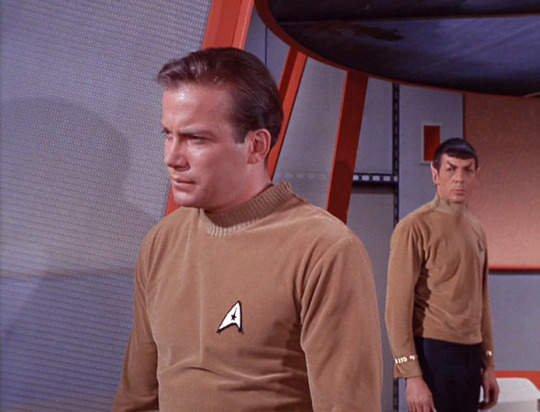
(the emotionless, stoic Vulcan who can supposedly feel nothing ever looks on concerned for his friend and captain. Does anyone in the crew really buy that no emotions story or-...?)
Spock basically restates what Kirk likely already knows (that Gary is dangerous, duh) and we also hear the first very important, vulnerable use of the name “Jim” instead of Captain. They’re alone, after all, and despite all protestations Spock knows how this affects his friend and cares about that. Deeply, perhaps. Even still, Spock isn’t one for soothing platitudes. He elects instead to remind Kirk of the facts of the situation and when he’s defensively asked to provide suggestions and not just state the obvious, Spock says they can basically maroon Gary on the planet they need the lithium crystals from or they can kill him. No pressure, Jim.
Kirk is upset by all of this so he tells Spock to “get out of here” and Spock insists that those are the choices, whether he likes it or not. “Would you try for one moment to feel?” Kirk rallies back, though he seems more sad than angry. “At least act like you’ve got a heart...we’re talking about Gary...” Spock says that the Captain of the Valiant probably felt the same way- and look at where the waiting got him! Spock also says he thinks he and Kirk probably came to the same conclusion. From the look on Kirk’s face we can assume Spock is right about that.
It’s interesting in this scene that the one thing we already know Kirk finds endearing about Spock -his defensive need for logic in any situation- is the one thing that irritates him enough here to throw back in Spock’s face when he presents the cold hard facts about their situation. However, we as the audience should know by now that the fact Spock was affected and moved enough by Kirk’s mood to stay back and talk to him in private indicates that he does care a great deal. What’s more, that logical perspective, rather than some simpering “poor you” sympathy speech, is exactly what Kirk needed to get his head back in the game and do what needed to be done.
This is the part where I’d go so far as to say Spock has been a better friend (boyfriend, in time) to Kirk than Gary probably ever was. Granted, most of what we’ve seen of Gary thus far has been under the influence of the evil tinfoil eyes, but we do know that Gary was one for toying with Kirk’s emotions to get him to behave a certain way (the “little blonde lab technician”). Gary is even more charismatic than Kirk and one gets the impression he knew what to say to get what he wanted long before the powers. Perhaps Gary was good at telling Kirk what he wanted to hear. Spock tells Kirk what he needs to hear and cares enough about him to bother.
In any case, the decision is made; Kirk will attempt to maroon Gary on the uninhabited lithium mining planet. He, Spock and Dr. Dehner return to Sickbay to retrieve him and Gary has become as cocky as he is powerful. He can read thoughts now so when Kirk asks him what he’d do in this position, Gary says, “Probably just what Spock is thinking now. Kill me, while you still can.” He smiles knowingly as Kirk goes and gives Spock a reproachful, sort of scolding head shake, but no sooner does Kirk come back that Gary strikes him with some kind of electric shock. Was this manipulative little smile just a result of evil tin foil eyes or was this some of a rivalry with Spock resurfacing? Hard to say for sure, as we don’t know much about Gary Mitchell prior to the evil powers.
Once Kirk is struck, Spock, the emotionless Vulcan who we can only assume has no impulse to act on, jumps quickly into action with his phaser because like hell you’re going to strike the Captain and get away with it. He too is struck.

(omg so emotionless, you guys)
Gary goes on some more about how powerful he is and how he needs the right world for his ends when Spock and Kirk somehow take him by surprise and restrain him to the bed (despite the fact that he’s supposed to have super perception and strength, but the plot needs to move after all). They also manage to somehow get him to stand up straight for the transporter despite being unconscious but, again, whatever.
Everyone beams down and Gary is put in a cell while attempts are made to salvage parts for the engines. Gary attempts some carefully worded manipulation on Kirk, recalling the time he intercepted some poison darts aimed at Kirk and nearly died from it, so why should he fear him now? Kirk calls Gary out on his true intentions and the ego that’s grown along with his powers betrays him when he attempts to launch out beyond the electric barrier. The shock drains his power and for a moment he returns to normal.
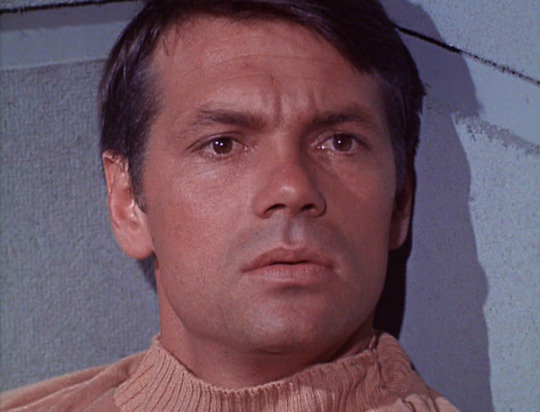
As Gary’s eyes return to their familiar brown, he says in a very small, soft, almost frightened voice, “Jim...” and we’re granted a much more vulnerable insight into the depth of his feelings for his friend. Perhaps there was some amount of manipulation to their relationship all along, exacerbated now by the god-like powers, but in this very brief moment we’re allowed to believe that perhaps Gary really did care for Jim in a sincere way as Jim so obviously cares for him. Masterful acting, that.
Unfortunately, it doesn’t last. When Gary’s eyes change back he hisses, “I’ll only get stronger. You know that, don’t you?”. Later, Scotty informs Kirk that the salvaged switchboard fits the Enterprise’s bridge and asks if Spock received the phaser rifle he ordered down. Kirk is confused for a moment until Spock shows up with the aforementioned rifle and he’s angered by this. He stomps over to a corner, followed by Spock who explains his reasoning in that Gary keeps getting closer to escaping the force field.
“Dr. Dehner thinks he isn’t that dangerous, what makes you right and a trained psychiatrist wrong?” Kirk argues.
“Because she feels, I don’t. All I know is logic. In my opinion we’d be lucky if we could repair this ship and get away in time.”
Kirk checks on the now completed self-destruct button that Lt. Kelso has rigged up. He shares a long look with Spock before reluctantly ordering the lieutenant to press the button if Mitchell escapes and there’s no other alternative.
This conversation between them is interesting because they’re essentially both avoiding the truths of their respective situations. Kirk sounds not unlike Dr. Dehner did when she was arguing for Gary’s innocence; desperate, emotional, smart enough to know better but compromised enough to convince herself differently. Of course, her arguments were fueled by romantic affection and Kirk’s could easily just be that of a strong platonic bond but...the fact that there’s a parallel between them is interesting.
Meanwhile, the audience should be well aware by now that Spock is quite capable of feeling and acts on those feelings and impulses more than he’d like to admit. I think on some level he and Kirk both know this, so arguing that he “doesn’t feel” wouldn’t really be a convincing argument in this case for someone who knows him so well, if it was meant literally. I think what is really being said here is that Spock isn’t so deeply emotionally compromised by Gary, whereas Kirk and Dr. Dehner are (but not both romantically? Hard to believe). Spock can see and own the difficult truth of the situation where Kirk cannot, or, rather, will not.
Unfortunately this plan doesn’t work out because Gary becomes wise and takes control of some wires to strangle and kill Lt. Kelso. Back at the cell Dr. Dehner continues to argue that he isn’t dangerous and Gary 100% backs her up on this by electrocuting and knocking out Kirk, and then Spock (who of course tries to shoot him with the phaser rifle after he dares to harm the captain). Dr. Dehner finally joins Gary and reveals that she, too, now has tinfoil eyes. SPOOKY.
Later, the not-McCoy doctor comes to tend to the unconscious Kirk and Spock. Kirk wakes first but asks that the doctor not revive Spock until after he’s left to go after Gary- further evidence to the fact that Kirk is well aware Spock feels and acts on something other than logic, particularly where his Captain’s well-being is concerned; either Spock would try to stop him or come with him for protection, but either way Kirk isn’t risking it.
Elsewhere on the planet Dehner and Gary are meandering around exchanging awkward dialogue, making the artificial plant section of Hobby Lobby appear around them and eating fruit and drinking water because apparently despite having god-like powers they still need the essentials to survive. Kirk does a poor job of hunting them from the shadows; they don’t need god-like extra perception to hear Kirk stumbling around, knocking over rocks and otherwise letting the whole planet know of what he’s doing. Gary tells Dehner to go talk to him so she can see “just how unimportant they are”.
The conversation that ensues is the kind that really elevates and defines Star Trek where it is in the pop culture subconscious, one that makes it more than just space people in space doing space things, a layer of complexity that I think has been lost in the translation to the frankly horrific ‘rebooted’ series (my opinion, your mileage may vary). Dehner insists that what Gary is doing is right for her and him and other powerful Espers like them, they are where it will take humanity eons to reach in evolution, but Kirk insists this isn’t true. Though Gary may have ‘god-like’ powers, he still has his inner human frailties and demons that his growing ego won’t resist. A true God needs compassion and wisdom to temper those powers. He begs Dehner to think about this like a psychiatrist would- logically, perhaps? Indeed, Kirk is pulling from that logical need Spock has aptly reminded him of.
Gary finds them again and physically forces Kirk to ‘pray’ to him while assuring him of his inevitable death. Kirk challenges Dehner in asking her if she likes what she’s seeing, “corrupt power corrupting absolutely”. She decidedly does not and finally strikes Gary with her own powers to stop him. He strikes back and weakens her significantly, but she’s done the same to him and this gives Kirk and opportunity to show off his infamous fighting skills, get his shirt ripped open, and straddle his probable former lover in the sand. Not the first time he’ll have borderline erotic fight like this with another man. In the end, he manages to trap and I guess kill Gary in the burial plot made for him. A strategically placed boulder is all that’s needed to stop god-like powers, I’ll have to jot that one down.

(there’s no good reason for this picture other than Shatner was a really hot piece of ass back then and I like to appreciate that from time to time)
The fight has weakened Dehner too much and she dies too, as I clumsily alluded to happening earlier in this write up.
Kirk returns to the ship and adds Dehner and Gary to the list of official losses and ends their service records with the honorable notation that they gave their lives in performance of their duties. Spock, looking concerned, seems to sense the difficulty in this for Kirk and comes to stand silently beside him- a subtle gesture of support and condolence, and it would seem sufficient at that, but then he goes on to assure Kirk that, “I felt for him too” where concerned Gary’s helplessness to the power.
Kirk seems a little stunned at the confession, but the smirk that follows says that he isn’t surprised and is furthermore pleased that Spock would openly admit what he already knows so well. “I believe there is some hope for you yet, Mr. Spock,” he subtly teases with a private grin and knowing look. Spock smiles too, but not until he’s looking forward where no one can really see, not even his Captain.
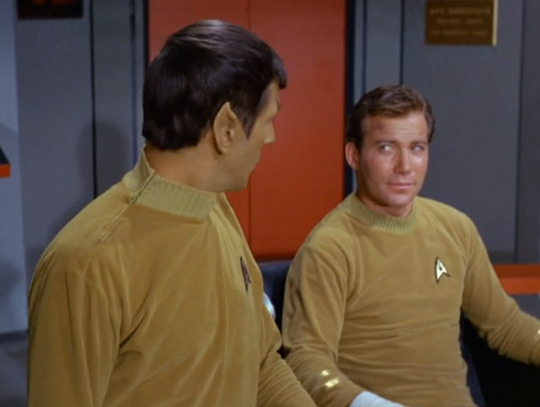
Certainly there’s a message in this episode about how absolute power needs morality and compassion in equal measure, but there’s also an interesting disparity between Kirk’s two closest ‘friends’. Even before the god-like powers, Gary is very charismatic and knows exactly what to say to make Kirk grin and blush and giggle, whereas Spock is very honest, straightforward, and no nonsense. Gary seems as if he was always emotionally an open book, whereas Spock for many reasons comes across as emotionally unavailable (even if that isn’t really true).
Assuming that there was perhaps a romantic, sexual history with Gary and Jim, it would be a natural assumption that Gary allowed Kirk ‘close’ to him pretty early on, though I think the genuineness of that relationship is difficult to really call for sure. Certainly there was a strong bond between them that I don’t doubt the honesty of, but I get the distinct impression that Gary probably did a lot in the way of bait and switch, reeling Kirk in and then pushing him back out when it suited him, manipulating him from time to time.
Spock, meanwhile, is the exact opposite. Not very charismatic, tells Jim what he needs to hear rather than what he wants to, insists despite the bond growing between them and the feelings and impulses that he acts on that he can’t feel. Or rather, won’t admit that he does. Perhaps this has created something of a frustrating barrier for Jim, always feeling as if he’s distant from Spock where Gary would let him in so readily.
However by the end, it becomes clear that despite his insistence to the contrary, Spock is the more devoted, the more caring, the more dependable ‘friend’, and maybe Kirk has decided he is more than willing to go the extra mile, however long it takes, to help Spock coax down those walls if he so wishes to further their bond...in whatever form that may take.
Thanks for joining me on this long ass study of Where No Man Has Gone Before. I’d love to hear everyone’s thoughts and feelings on the episode, what I’ve made of it, things I may have missed, etc. HMU!
Join me next time for a similarly long write-up and subtext evaluation of The Corbomite Manuever.
#star trek tos#spirk#space husbands#captain kirk#spock#subtext study#slash#come hop aboard the uss kirk is pansexual headcanon ship#season one#episode one#where no man has gone before
270 notes
·
View notes
Text
15 Types Of Archetypes In Video Games
The Cool Cat: This party member never really feels threatened by the impending doom your team is repeatedly facing. They always seem to show up at just the right time, solving your particular crisis with barely any effort and acting like it was no big deal. Rarely do they feel a need to raise their voice
The Noble: The Noble always conveys a sense of importance and gravitas. Their clothing is the cutting edge of virtual fashion, and they do everything with a sense of proud (arrogant, even) conviction. Some are friendly; others seem cold and distant. But at all times, The Noble is driven by their own motivation--a personal goal that they hope to accomplish on the way towards helping you defeat evil once and for all. This goal can be the righting of a personal wrong done by or to them, or the exorcism of a personal tragedy that has haunted them for years.
The Gentle Giant: Appearances can be deceiving, The Gentle Giant, who's constantly getting misjudged for their colossal stature and intimidating physique. In truth, The Gentle Giant loves peace above all things, and prefers a simple life to all the bloodshed inherent to most RPG adventures. They tend to be more of the strong, silent type, offering a few key words of wisdom to the conversation when you least expect it. On the other side of the spectrum is The Gentle Giant that talks a big game about how tough they are, in a thinly veiled attempt to hide their soft side.
The Irritable Punk: They'll help you, sure, but they don't seem particularly happy about it--because they don't owe you anything. Like The Cool Cat, you can always count on The Irritable Punk in a fight--but outside of combat, they're incredibly antagonistic, questioning your every action like they know better. When you first try to pry into the deeper layers of their personality, The Irritable Punk will vehemently resist--but keep at it, and you'll soon uncover the good-natured comrade underneath all the unnecessary attitude.
The Compassionate Mystic: Putting others before one's self is what The Compassionate Mystic is all about, and they'd gladly sacrifice their well-being if it meant sparing another party member harm. The Compassionate Mystic is often the last of a great lineage, or burdened with a great supernatural power--but they'd only think to use this power in the quest to help others. They're the voice of reason and empathy when other party members demand aggression, acting as a soft-spoken mediator between party members.
The Adorable Cutie: The Adorable Cutie seems too delightful to exist. They maintain a cheery, upbeat attitude all night and day. Upon meeting them, you'll immediately discount their combat abilities. The Adorable Cutie's cuteness conceals expert combat skills or a propensity to cause chaos, knowingly or not.
The Boring One: The Boring One you cant seem to remember their name, backstory, abilities, or motivations. But as it stands, nothing about them seems all that memorable, and your other party members are so much more interesting by comparison.
The Raging Flirt: Every other sentence out of their mouth is either a pick-up line or some form of innuendo--the kind that would typically be grounds for mandatory sexual harassment seminars. Maybe The Raging Flirt is constantly overwhelmed by lust; maybe they're just romantics who think they're God's gift to the present company. Usually, The Raging Flirt's incessant advances get them absolutely nowhere, but that certainly won't stop them from trying.
The Outlier: The Outlier hails from a race quite unlike the rest of the party, and though they're not ostracised for their differences, they always stand out in your party's group photos. Sometimes The Outlier has defected from the opposing side; other times, they're the last of a rare lineage.
The Rebellious Royal: They come from a place of power, wealth, and prestige, yet they've felt helpless their whole lives for how little control they have over their own destiny. The Rebellious Royal is often related to a primary force of evil, by blood or duty--but they've since renounced the ways they grew up with as wrong and unjust. Now, with the help of you and your fellow party members, The Rebellious Royal can finally show their ancestors their newfound independence and ideology.
The Mercenary: Greed is what motivates these types when you first meet them. Joining you on a righteous quest is fine, but The Mercenary always puts profits before the greater good. As an adventurer for hire, they're constantly reminding you of the mercenary profession's self-centred ways, and the eventual payoff they expect to receive at your journey's end. But somewhere along the way, The Mercenary gets over their obsession with money, experiencing a revelation when they realise that there's more to life than coins and bills.
The Unwitting Bigot: The Unwitting Bigot is often racist. Skin colour typically isn't the determining factor--it's a more a species thing where concerned. When they first join your party, The Unwitting Bigot will make you and all your allies extremely uncomfortable with their rampant intolerance and discrimination. But after a while The Unwitting Bigot will inevitably snap out of their prejudice-filled ways after something drastic happens.
The Grizzled Veteran: The Grizzled Veteran is often offered one last chance at redemption before they succumb to death and/or disease. They can be a mentor, father figure, or reluctant curmudgeon, but they always have some wisdom to impart when your party needs it most. The Grizzled Veteran has seen what evil can do to the world, and they're pretty keen on making sure that you don't repeat their mistakes.
The Staunch Optimist: Nothing gets The Staunch Optimist down. As the upbeat member of your party, they always chime in with compliments and reassurances, even when things look grim. For some players, this constant reassurance will be a comfort. The Staunch Optimist usually fills the role of your protagonist's best friend, or the party's comic relief. They seem to wear a smile at all times--but as the plot progresses, you might learn that it's all a front to forget a dark past. Or maybe they really are just that happy.
The Bench Warmer: The Bench Warmer, whenever they open their mouths, you either yawn or groan, they probably have a lot going on in their virtual lives, but you can't be bothered to find out what that may be, exactly. At best, you'll forget that they even exist, since you never speak with them or take them into battle.
all these can be relevant to what i am thinking of producing for the practical side of this project-i am thinking of creating characters of my own design which define the clear archetypes within the jungian theory and are used regularly within video games
1 note
·
View note
Note
Hello? I'm currently trying to write a superhero novel and I'm extremely bad at it. Can you help me, like just give a few tips? I'm really excited about this project so your help would be greatly appreciated. Thanks in advance!
Hello dear Anon! You have definitely come to the write (hehe) place. I have so much advice (and hard lessons learnt) to share that I almost burst with information when I saw this ask in my inbox. I’ve tried to trim it down a bit so I don’t clog up people’s dashes, but this is still gonna be pretty long. (Also, this is my 4,500 post on this blog, quite coincidentally, and I also just passed 700 followers. Consider this advice post my celebration!)
This is a novel, not a comic book series.
You won’t be able to convey every awesome aspect of your characters’ looks without boring the reader to death.
Some tropes don’t translate well. At all.
Nothing is wholly original, not anymore. But you can still come up with something you can comfortably call your own.
Action scenes will either become your trusty sidekick or your archnemesis (and each one can turn out to be either).
LESS. IS. MORE.
1) This is a novel, not a comic book series. Even if you write a whole series of novels, you don’t have the page space to waste on the tens or hundreds of smaller villains you might find littered across a Batman series. First of all, everyone your hero encounters has to be fleshed out at least somewhat, and that takes up both space on the page and in your reader’s mind as they try to keep track of everyone you’ve introduced. If you need to make your hero seem as though they’ve been around for a while and save a lot of lives on the regular, have them namedrop villains they’ve defeated or muse about just how many civilians they must have saved over the years and how that makes it all worth it.
What I’m saying is, you need a coherent plot. Obviously the journey from A to B needs ups and downs, but those probably shouldn’t consist of 18 minor villains with the Big Bad at the end unless all the attacks turn out to be related. Keep your plot tidy, and remember, this is a novel. For the first book at least, you might be better off sticking with one supervillain/group as your major antagonist, with subplots constructed from other, less major conflicts (tension with law enforcement, other heroes, collapsing marriage, love interest, high school issues etc. etc.). In my first attempt at a superhero novel, I had my hero (Ace) fighting gangs and cleaning up the streets, saving kids from their own stupidity, dealing with a new addictive and highly highly dangerous drug pouring into his city, trying to uncover who or what the Crime Syndicate was, fending off the police who were trying to arrest him, and a bunch of civilian life problems too, including his mother and best friend trying to work out what he was hiding, passing university and finding a job, all on top of tracking down and fighting his newfound nemesis. This is a slightly exaggerated list, but you can see what I’m talking about. Too much going on can kill your coherency, even if it’s the kind of winding plot you’re used to seeing on comics.
My tip here: pick one main villain, or gang, or anti-hero etc. –pick only one major villainous entity. Stack in one to three sideplots. Make sure everything is coherent and leads your hero from A to B, whether they know it or not. It might be a superhero novel, but it’s a novel above all. Stick to your basic plotting rules, and you’ll be a-okay.
2) You won’t be able to get down every aspect of your character’s awesome outfit. This is another rule applicable to everything, but it’s especially hard to resists in a genre where a hero’s public image is often built from their outfit and powers as much as what they stand for. But imagine if you had to read a block paragraph description of Batman’s outfit? He wears all-black, with a cowl covering the top half of his face that has pointy bat ears which electrocutes you if you try to take it off. He also wears eyeliner to cover the skin around his eyes. He never smiles, and his voice is a deep growl. His chest plate is black and decorated with false abs and a bat-symbol, which is yellow or black depending on whether he’s in camouflage- YAWN! I’m bored just typing all that out.
Pick defining characteristics for all of them. My villainess has candyfloss pink hair, a slow smile and a dappled black outfit fit for a thief. My hero is half-Japanese, wielding a glowing blue sword (which might become a shield in the edits) and donning his heirloom hero suit of black and matching glowing blue. It’s not a lot, and I drop in other details here and there (she carries smoke bombs and knives in her boots, he can’t wink), but sticking to core, important details when describing their outfits in particular can give a pretty clear idea without choking the reader.
3) Some tropes don’t translate well. At all. Put aside the rampant racism, the homophobia, the general mistreatment of many minorities in the comic industry. Put aside the America-centrism and the fridging of ‘pure’ girlfriends and the slutty villainess alike. These are all problems, but they also exist outside of the superhero genre.
Here, I’m talking space radiation giving people powers, killing their loved ones, serving the plot in any which way. I’m talking Superman’s 800 superpowers and Luthor’s inability to figure out his secret ID despite being the smartest man on the planet. I’m talking fallacies of logic, stretching the suspension of disbelief far past breaking point, Gary Stus galore. I’m talking Guy Gardener’s bowlcut. Y’know, just generally bad writing.
You’re going to have to come up with more original power-origins and better haircuts than they did in the Golden Age, I’m afraid. While I genuinely wish I could get in the invisible brainwave-controlled escape boomerangs from Captain Boomerang in the Silver Age, it doesn’t work so well in a pseudo-serious novel. But work a little harder at your worldbuilding than the golden oldies had to, and you’ll have everything down pat.
4) Nothing is wholly original, not anymore. But you can still come up with something you can comfortably call your own. This is linked to point three. Everything has been done. Every superpower, every storyline, every outfit, magic item, warping of genes. You name it, someone, somewhere, whether inside or outside the big comic houses, has done it. This is common with all ideas, but with superheroes you know some all-knowing jackass will pop out of the woodwork like ‘actually this was the plot of Assman #236 in 1987 and your just a hack’ if you ever publish your work.
Fuck ‘em. You might not be able to create something wholly original, but you can create something with a twist. From your superpowers and gadgets, to your plotlines and your worldbuilding, to your hero leagues and villain cadres and your mob squads –you can create something fresh, something we’ve never seen before, something that will open mouths and eyes and hearts. Everything can be original if you take it and play.
5) Action scenes will either become your trusty sidekick or your archnemesis (and each one can turn out to be either). Some will flow from your pen (or keyboard) as though the Muses themselves are scribing your words with golden ink. Other times, you will want to strangle every one of your characters, and throw their weapons, your writing implements and yourself out of the window. The real problem is that action scenes tend to be crucial to this genre, and you never know which fight scene is going to bite you in the ass.
It’s okay if you’re terrible at them (like me). Sketch what you need out of the scene in terms of plot, and then research to your heart’s content (while remembering this is a genre built on ridiculousness and you can stretch reality as far as you need). Then, as with wit, remember you don’t have to be an expert fighter. Unlike your characters, you can write and rewrite and play and mess with until everything is exactly how you want it.
LESS. IS. MORE. I think this is the sum total of my advice, though bear in mind that I’m a massive overwriter: if you underwrite, you might need to flip some of this advice on its head. In my experience, keep your original plot tight, because it will expand with heroic shenanigans and villainous sideplots. Keep your initial character description to key characteristics, and build in the cool, extraneous details over time. Watch out for some of the good old tropes (and not just the bigoted ones) that simply don’t translate well into a modern novel. Play with your assumptions, your tropes and anything else you can get your hands on, but don’t be too afraid to hang onto some of the old classics: this is a genre known for its fun tropes, after all.
If you need any more general writing advice, feel free to come back! You are talking to someone who wrote 60,000+ words of my core superhero novel and scrapped every single one of them, who’s plotted out seven superhero novels and counting, and who may or may not be far too in love with this genre.
But over everything else, remember to take all advice -including and especially mine- with a large pinch of salt. Come talk to me off anon if you just want to chat about superheroes, I don’t bite (and I really, really love superheroes).
Thanks for the ask!xx
#advice#my advice#heroes and villains#superhero novels#amwriting#writing advice#mine#superheroes#supervillains
104 notes
·
View notes
Note
Hello! I want to get into watching the Office because it seems really good and I loved Parks and Rec, but everytime I start watching I can't make myself continue. The first few episodes are just like... the punchline that everyone is racist just happens too often for me to swallow. Is there a point where I can start watching where the writers kind of leaned away from this or should I just tough it out?
Hi! So, this is going to be a long answer, and I hope that’s all right, haha. As someone who loves both The Office and Parks and Recreation (though I actually like The Office a bit more, even though I think Parks & Rec is more consistent across the seasons in terms of quality), I have a lot of thoughts on both.
So, here’s the thing:
Although The Office and Parks and Recreation were created/produced by the same guy (guys? I know that Michael Schur for sure worked on both, though I think there was one other person working on both as well), they’re very different in tone. Whereas Parks and Recreation tends to be more optimistic and idealistic (in that even when things go wrong for the cast in the short-term, in the long-term they’re almost guaranteed to succeed, and even when there’s squabbling and bickering, for the most part the characters tend to be optimistic, and idealism---particularly Leslie’s idealism---is rewarded), The Office tends to be more caustic and cynical. Things very often don’t succeed for these characters in the short-term (long-term projects don’t happen as often, and even then there are a few big long-term failures), and they’re much, much more prone to being snarky and cynical. Additionally, whereas snark and cynicism are often “punished” on Parks and Recreation (in that the cynics are usually proven wrong/converted to idealism, again, usually by Leslie), this isn’t the case on The Office. Not only is The Office a world of snark, but since things don’t tend to magically work themselves out on The Office due to it arguably being a more realistic setting (I mean, Pawnee, Indiana isn’t even an actual city that exists, whereas The Office takes place in the very real Scranton, Pennsylvania), cynicism isn’t punished here because having a more idealistic outlook---particularly without the experience or power necessary to back it up---is more likely to backfire than it is to succeed. (i.e., although Michael very often wants everything to magically work out . . . it usually doesn’t.) And that’s not to say that The Office is a depressing show where everyone always loses, because that’s not true, but it is to say that while the antagonists on Parks and Recreation are caricatures of people rather than opponents that actually exist (and as such our idealistic protagonists can more easily overcome them), the problems and antagonists on The Office are more grounded in reality and, as such, reality tends to ensue.
So with that said, I first want to address something you said about the early episodes, which is here:
“The first few episodes are just like... the punchline that everyone is racist just happens too often for me to swallow.”
I actually find it interesting that this is your viewpoint, because my opinion is that The Office, as a whole, actually tends to show this attitude in a negative light!
The episode I think you’re mainly thinking of happens in season one, and it’s episode two (I believe)---“Diversity Day.” In it, corporate has sent an ethics counselor to the Scranton branch of Dunder-Mifflin (where our main cast is employed) to give a diversity seminar because Michael, the boss, imitated a Chris Rock routine and was rather ignorantly racist while doing so. Michael, of course, hates the idea that anyone but him could be in charge (and is also too ignorant to realize exactly how and why he was being racist), and as such he not only ruins the seminar, but then proceeds to make everything more offensive by having “diversity activities” throughout the day. This culminates in him being slapped for real by Mindy Kaling, who was playing Kelly Kapoor.
Now, with that being said, I can understand why that would be hard to swallow! It’s not easy to see a character acting like that. But the thing about The Office is that we’re not supposed to be laughing with Michael, or sympathizing with him; it’s very intentionally framed (in my view, anyway) that he is in the wrong when he does things like this. We see this via the more heroic characters in The Office finding what he’s doing wrong, offensive, awful, and very often calling him on it (especially as the series goes on). For instance, in “Diversity Day,” it’s clear that no one there really approves of what he’s doing. They’re all going along with it because they have to, but while there are some characters who do hold bigoted viewpoints as well (e.g. Dwight and Angela, who are also not shown in a heroic light, especially at that point in the show), the characters that we’re meant to sympathize with (e.g. Jim, Pam, Oscar) don’t agree with what’s going on, and usually say so. (e.g. Pam says, “Based on stereotypes which are not true and that I do not agree with . . .) So in this case, it’s not, “haha, racism is funny!” but more, “my god, this guy is such an ignorant ass, and yet there are people like him out there, and people like these office workers who have to suffer through it.”
And that’s the thing: Parks and Recreation has a lot less of that (once they stop trying to have Leslie be Michael near the end of S2---because she made quite a few ignorant/racist comments toward Tom in the first two seasons), but it was also more of an idealistic show. The Office shows that people have prejudices, bigotry, et cetera, but always in a negative light. We’re never supposed to sympathize with Michael when he makes comments like that, and we’re certainly not meant to sympathize with disgusting characters like Todd Packer (who I believe is introduced in S2, but he might make an appearance in S1). Granted, Packer’s scenes are never funny to me regardless, but he is important to show Michael’s growth later on, so. Regardless, although The Office does include things like that, they’re never meant to be the punchline. It’s not, “laugh at the racism!” but rather “isn’t this awful? and isn’t it awful when things like this happen in your workplace? because we know they do, we’re sure of it, even if we’re exaggerating it a tad for comedic effect.” Especially later on, that sort of behavior is always framed as wrong.
WITH ALL OF THAT SAID! (I told you this was going to be a long response, haha, I have a lot of feelings.)
Just like how Parks and Recreation’s first season was so horrible that even the cast denounces it (“Don’t bring up those shitty episodes!” said Aziz Ansari during a cast panel), it’s pretty much agreed upon that the first season of The Office is the weakest season as well, due largely in part to the producers trying to create the British original. In fact, the first episode is pretty much a shot-for-shot remake of the British original. In season two, however, they break away from the U.K. formula and become their own thing, and from then on it’s pretty much unanimously decided that the U.S. The Office surpasses that of the British original. The characters become fleshed out, the storylines become deeper, and overall the show vastly improves.
So, with all of that said?
I do still recommend toughing it out through the first season since it’s only six episodes long, and there are some great little subplots in the first season as well (such as Jim and Dwight’s alliance). Plus, there are a few nuggets of plot in the first season that continue into the second (such as Jim’s temporary girlfriend, Katy). But if you’re having trouble with the first season (and I don’t blame you!), then I would recommend skipping the first two episodes (“Pilot” and “Diversity Day”). That leaves you with:
“Health Care”
“The Alliance”
“Basketball”
“Hot Girl”
The most important episode here is “Hot Girl” (which is the last episode of season one), due to the fact that Katy is introduced in it, and she makes reappearances in season two. That said, I think the others are worth watching as well. “Health Care” has some great shenanigans in it, shows how ineffectual Michael is as a boss/how desperate he is to be liked, and is good for Jim/Pam content; “The Alliance” has the hilarious subplot of Jim and Dwight’s alliance, which, trust me, is more hilarious than it sounds; “Basketball” does have more of Michael’s ignorance (he’s ignorant a lot, it’s a marked character flaw, but he’s never rewarded for it and he develops through it as time goes on), but I feel that it’s still important for Jim/Pam content; and “Hot Girl” is necessary for reasons started above.
All of that said, again: There is a noticeable quality jump from the very first episode in season two, “The Dundies,” which is where some of the most notable quotes from the show come from (e.g. “I feel God in this Chili’s tonight”). So if you really want to you can skip straight to that, but I recommend at least watching “Hot Girl” first, as well as the others noted in the bullet list.
Again, sorry this is so long, but please feel free to ask for further clarification! The Office is definitely one of those shows, I think, that has a certain tone to it that can be a bit hard to get used to---but I also think it’s really worth it, and it does have its successes and moments of idealism as well. (In fact, the series ends with one of the most hopeful quotes imaginable (“There’s a lot of beauty in ordinary things. Isn’t that kind of the point?”), so there is definitely some hope there. There’s just also a lot of, well . . . snark, too, haha.)
7 notes
·
View notes